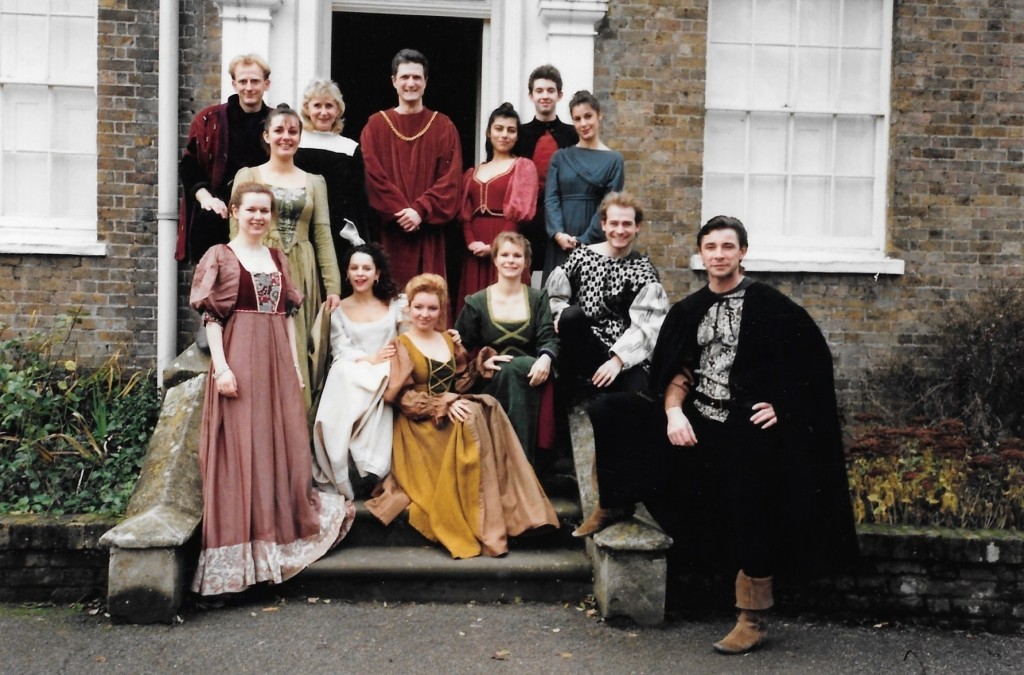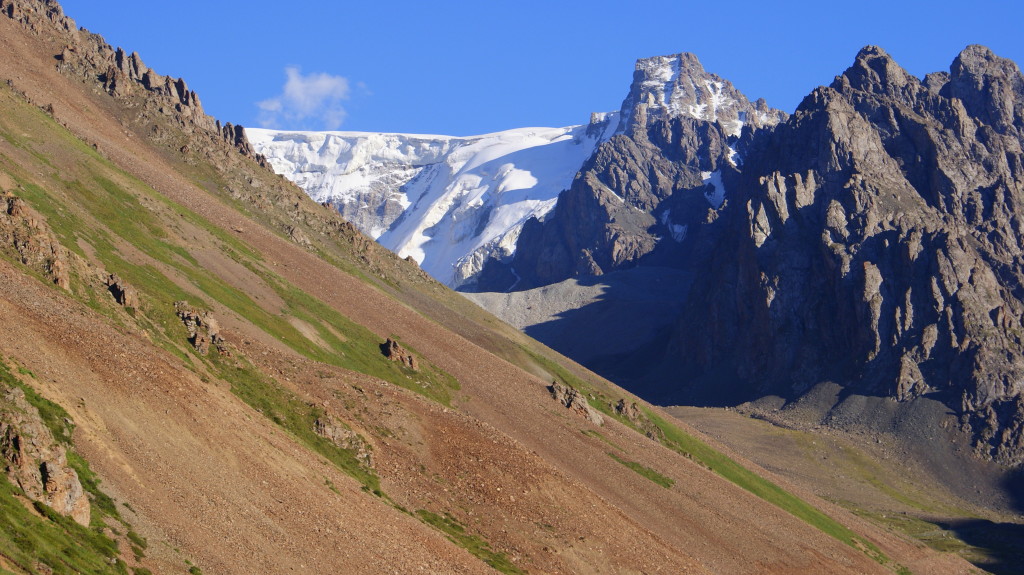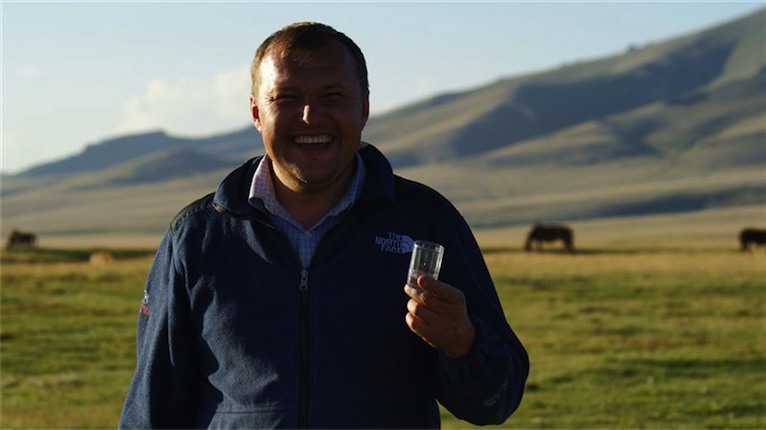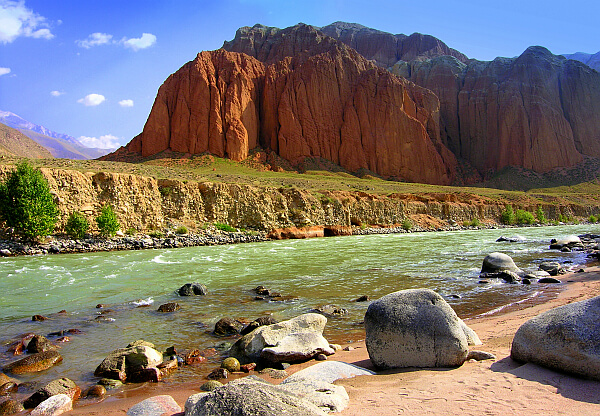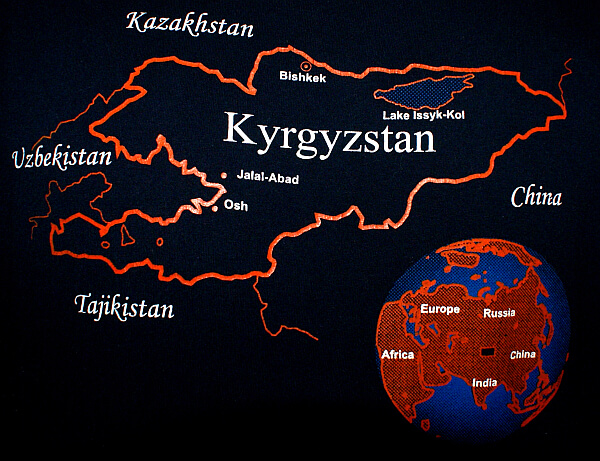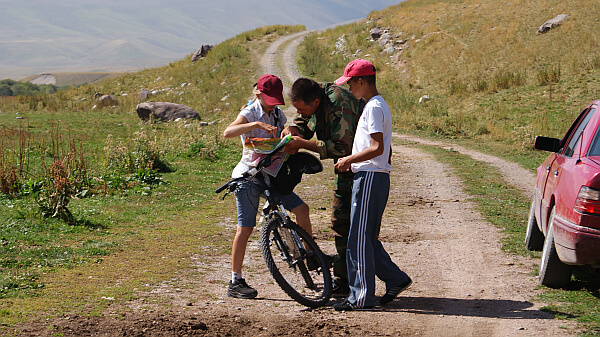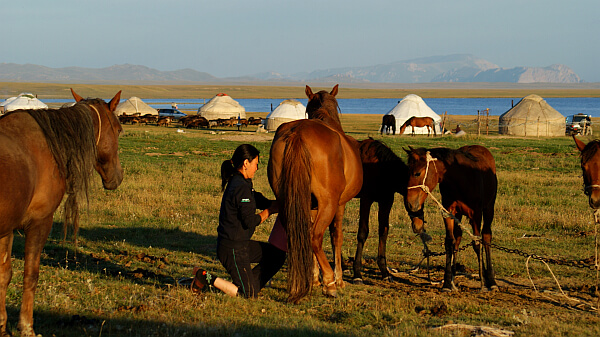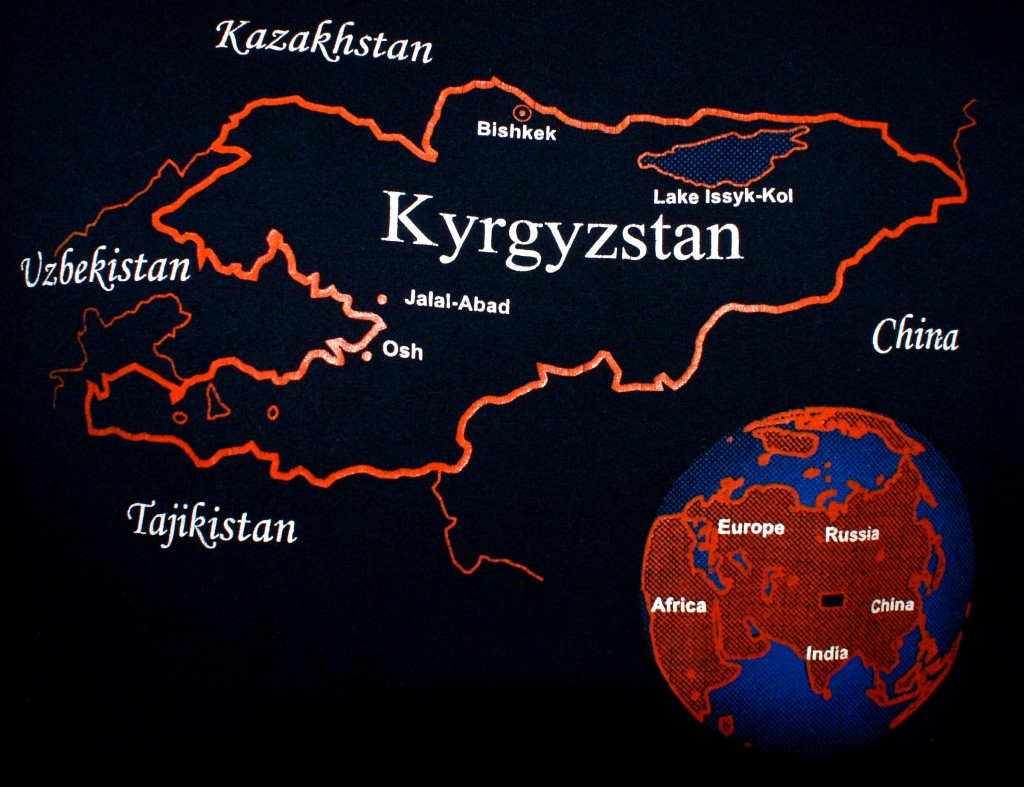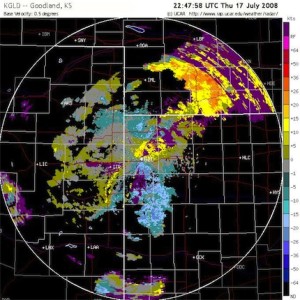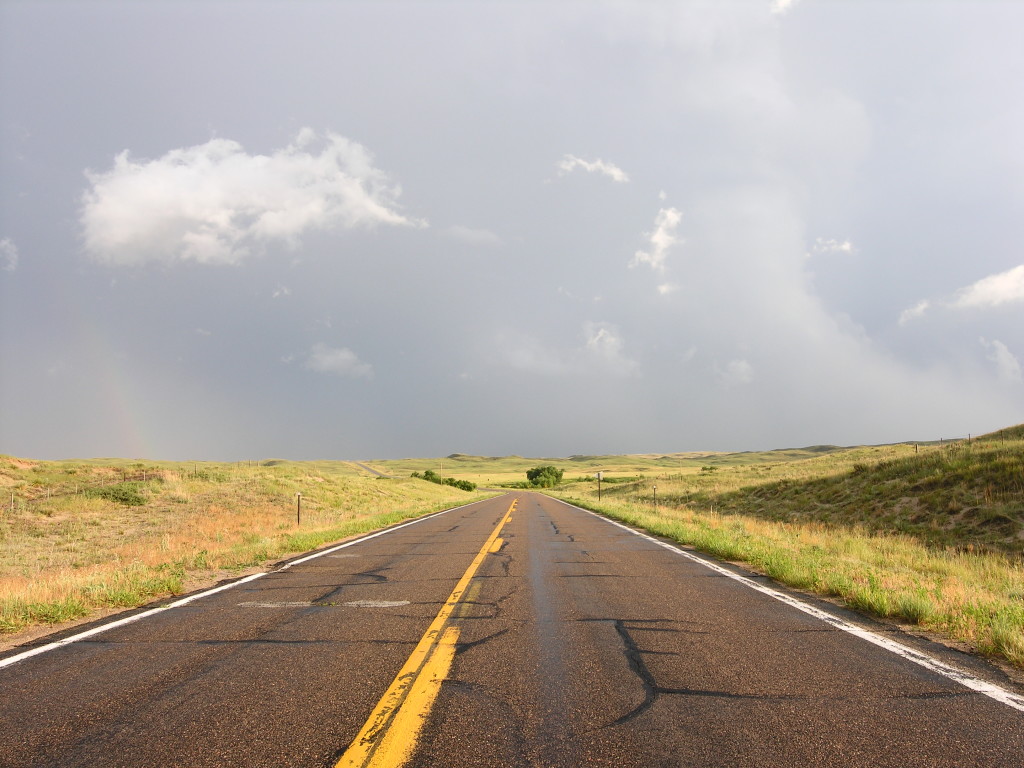
That Time a Stranger Joined My Honeymoon
story and photos by Kirsten Koza
(first published in Perceptive Travel Magazine – USA)
Spring 1990: Malcolm, my ex-boyfriend, was on one knee amongst the rubble in my East London room. My bedroom was basically a walk-in closet where I kept a toppling tower of swords and tap dancing shoes. The only good things about my flat were my eccentric roommates, it was across from a pub, and it was just a five-minute stagger to East 15 Acting School where I was currently performing in Shakespeare’s Pericles.
Malcolm, a Civil Engineer, had flown from his orderly home, north of Toronto, to spend Easter with me in England, and I hadn’t even tossed my clothes into my wardrobe. He was holding an emerald ring. “Would you…?”
My flat was one-hundred percent slum. I’m not being overly dramatic. It was so bad that after we’d been broken into, a London Bobby walked into my un-ransacked room and said, “My-my, look what they did in here!”
Why was Malcolm kneeling? I wanted to kick him.
“Kirsten, will you marry me?”
I could say no. I was twenty-three and Malc, twenty-six. What was the rush? This was a logistical nightmare. Why was he looking at me all doe-eyed? Beam me up, Scotty. I fidgeted on the edge of my crappy single bed. I didn’t even have a toilet seat in my flat. Koza to Enterprise. Malc had gained weight since I saw him in January.
“Yes.”
I still wanted to kick him.
Malcolm obviously didn’t know what to say next. “Your production of Pericles was ummm…”
“Um is polite.” It was the worst show I’d ever been in.
Off to Sicily
It took Malcolm one day to decide he wasn’t spending his holiday in East London. I’d urged him to bring his mountain bike to the UK. That morning he’d left his bicycle at my place while I was at the college, and he took the tube into London. Malcolm returned with plane tickets to Sicily, a map, and a copy of The Rough Guide. This was to be our honeymoon, since we were already overseas and were going to be married in just a few months.
That very same night Malc was refilling his bike tires beside the baggage carousel at Palermo’s airport, and I was fiddling with my broken gear shifter.
“Hello. Do you want some riding company?” An Englishman in his late thirties had wheeled over his beat-up touring bike. He wore jeans with clips around the ankles.
“Sure. Which way are you heading?” Malc stuck out his hand.
“Towards Trapani, along the coast, but just to a nearby hotel for tonight.” The stranger looked at me. “I’m Christopher Crawley.” He saw me eyeing the bug nets attached to his bike. “Entomologist, with the British Museum. Everyone just calls me Crawley.”
“Kirsten and Malcolm,” Malc replied. “We’re heading towards Mount Etna. Opposite direction.” He pulled his map from his pack.
“You know, the traffic will be quite thick that way. Towards Trapani is much quieter and less populated this time of year.” Crawley peered over Malcolm’s shoulder at the map.
“Hmm,” Malcolm pondered. “Maybe we should go the way you’re going.”
I frowned. I really wanted to see an active volcano. And I really didn’t want to travel with Christopher Crawley.
“It’s eleven-thirty. Might as well go find a hotel. Maybe we should share a room to save money,” the entomologist suggested.
“Great idea!” Malcolm clapped Crawley on the back.
What? Had Malc just invited this stranger to share a room with us on our honeymoon? Oh, my God! He had! I shot dagger-eyes at Malcolm. He didn’t receive my message.
A Threesome on the Road Together
Two days later, we were still biking and bunking with the bug doctor. An old lady in black was showing us our room in the Spaghetti Western village of Scopello.
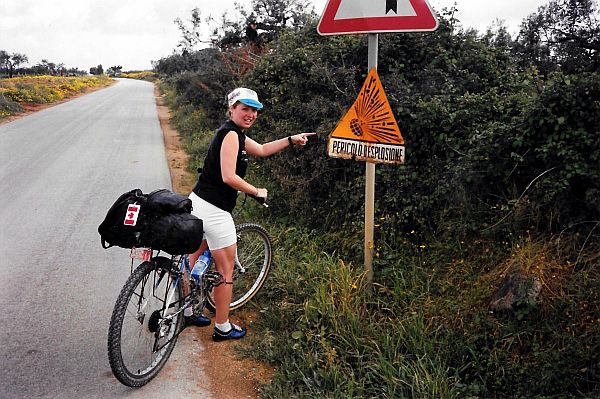
I was shivering after the pedal in pelting rain along the rugged coast from Castellammare. I jumped under a blanket on one of the many beds that butted end to end along the walls. If you opened the desk drawer, I bet you’d have found a bed.
The lady said something about no heat. “What?” I wailed as she left. Crawley rifled through his bags. He’d be used to freezing; the museum paid diddly-squat. He probably had some fingerless, Scrooge-gloves in his panniers.
Malcolm stripped off his wet clothes. I looked at his Schwarzenegger-like chest with disinterest. Crawley was watching him too. I decided to grab a shower before either of them used the hot water.
“We’ll just have to have some grappa,” Crawley pulled the hooch from his bag.
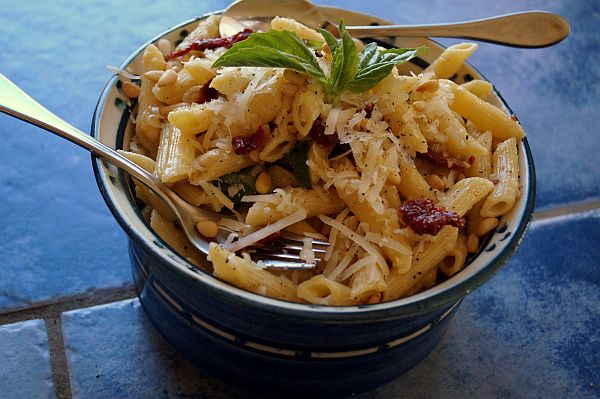
“Tutto, tutto!” Another old lady in black was stooped over my mixing bowl of penne “Tutto!” She motioned for me to keep eating. Why wouldn’t she leave? I rammed another forkful into my mouth. I raised my wineglass in salute. She smiled and backed towards the pensioni’s kitchen.
“Excuse me.” Crawley got up to go to the loo.
As soon as he was out of earshot Malcolm grabbed my arm. “Crawley proposed a threesome while you were in the bath.”
Wine filled my sinuses. “Pardon?” I spluttered. “What the hell did you say?” I blotted red wine off my turquoise jacket.
“I reminded him we’re engaged.”
“So! He’s married!” This was not what I expected from a mild-mannered entomologist who wore bike clips around his trousers. “Is he interested in guys too? How would it work?” I suddenly realized Crawley had been looking at Malcolm perhaps differently than I’d assumed. I’d thought it was muscle envy. How were we going to share a room with him now?
“I told him that I had no interest. He’s fine with it.”
“Well, I’m not.” I chugged the rest of my wine. “There hasn’t been a hint. How long has he has been thinking about this? Maybe that’s why he hooked up with us in the first place.”
Creepy Crawley was coming back to the table. I flushed tomato red. I waved to the old lady who was peeking from the kitchen door. “Grappa?” I called to her.
Tucked in our beds in the bone-chilling pensioni, the air was thick with tension. I couldn’t sleep. Malcolm was horny. I could tell by the object poking into my back. No way was I going to have sex. I could feel Crawley listening in the dark. I closed my eyes and called for the starship Enterprise.
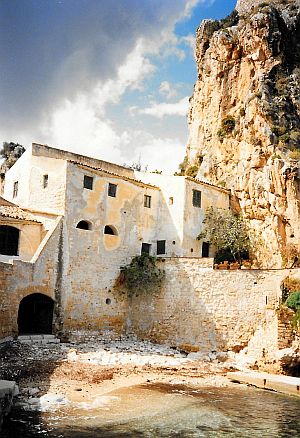
At breakfast Crawley suggested we all go down to the abandoned tonnara for a swim. But after breakfast Malcolm bailed. He was sick and wanted to stay in bed. So, now I was down at the stony beach with Crawley—just me, and Creepy Crawley. The cliffs and old buildings loomed over us. The entomologist was puffing on a cigarette. I didn’t know what to say. I decided to go for a dip. I shed my clothes down to my black one-piece and tiptoed into the March Mediterranean. My breath was whacked out of me by the cold. I went deeper and a wave came over my shoulders. That was enough. I went back to my towel and Crawley.
“Can I bum a smoke?” Malc hated it when I smoked.
“Certainly. How’s the water?”
“Invigorating.” My hands shook as I tried to light up.
“Well, I guess I might as well.” Crawley stripped down to his underpants. Then, right in front of me, off came his boxers. I looked away. I looked back. Holy cannoli, the man was hung like a donkey, a stallion, a blue whale!
Crawley hobbled over the rocks. I stared at his white buttocks. I was in a state of shock, induced by the sheer mass of his manhood.
“Woah.” Crawley had entered the sea. “Wo—” a wave had lapped his privates. He ducked under. He turned around and walked towards me. The icy temperature had done nothing to the size of his penis, nothing! It still swung near knee-level. Where had he been hiding that beast? I looked at my cigarette. I looked at the historic towers on the cliffs. My gaze drifted over Crawley again and then darted quickly up to the fluffy, white, clouds.
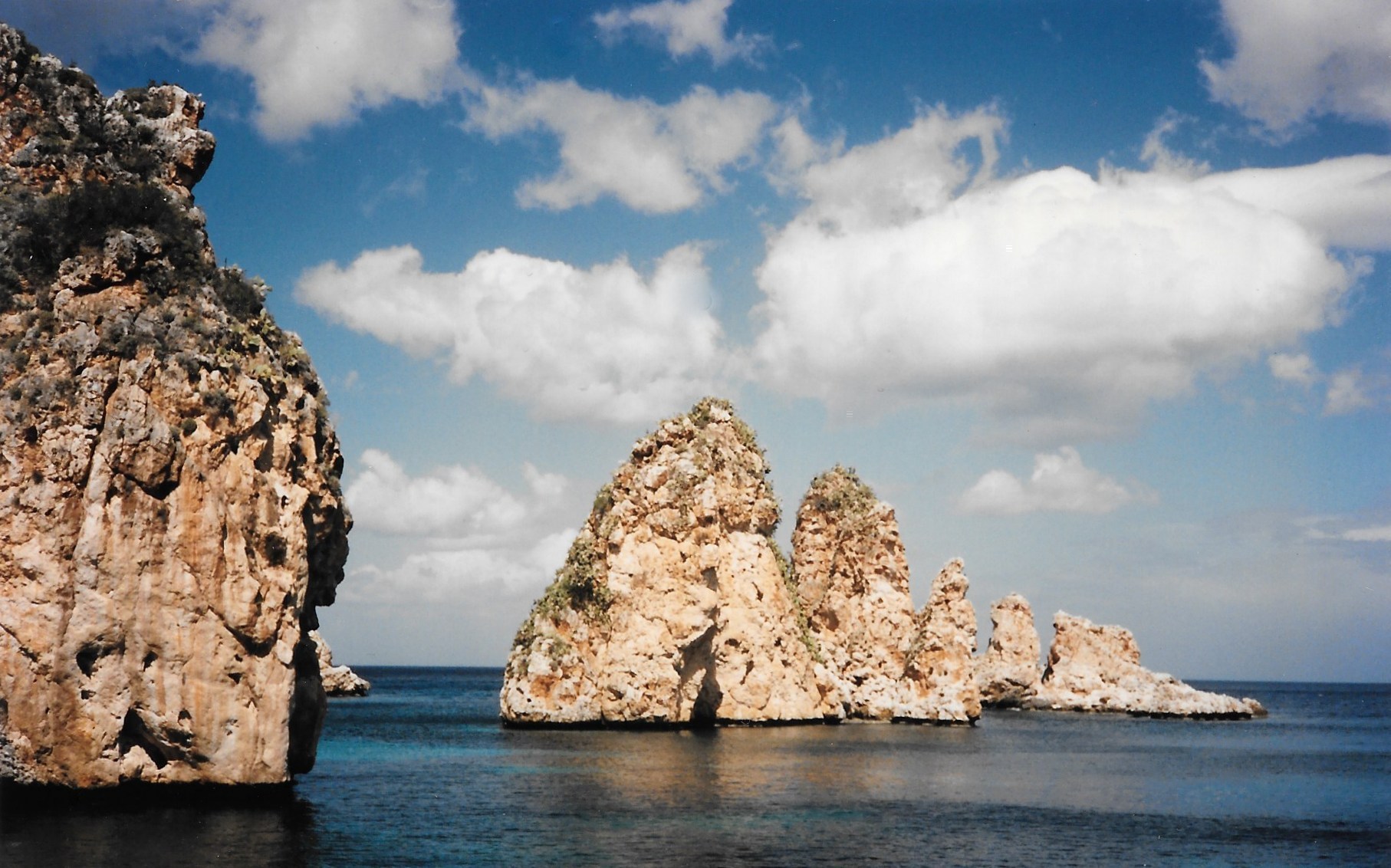
Sicilian Longevity on Display
Crawley and I returned to the pensioni to get Malcolm for lunch. Malc rolled over in bed. So, Crawley and I decided to go for a beer. We sat at an outdoor table at the Scopello bar inhaling springtime between cigarettes. This was uncomfortable. And it was all due to this threesome thing, and well, now, the image of bug-man’s penis kept flashing through my mind.
“Do you want another?” Crawley pointed to my third beer.
“I think I’m done, or I’m going to fall asleep.” I snuffed my cigarette.
“Why don’t we go lie on the grass?” Crawley nodded towards the small park beside the patio.
“Sure.”
We paid and moved five feet over onto the grass. Just as we sat, a smoke billowing bus, belched open its doors and boisterous Sicilian seniors erupted from within. A couple of young women helped the more decrepit onto benches. Another heaved wicker baskets covered in brightly coloured fabric.
“Something tells me these people have their own teeth,” Crawley whispered. Huge lengths of chewy Italian bread were being sliced open. There were whole prosciuttos, capocollos and salamis. There was a wheel of cheese that could support the bus. There were stuffed tomatoes, slices of roasted eggplant and red peppers dripping in olive oil. Mount Etna sized sandwiches were erected and spilled filling like lava.
One of the young women handed sandwiches to Crawley and me.
“Guess how many years have I!” A spry old man in a charcoal three-piece suit danced before me. “What you say if I say ninety-nine years? My birthday next week and I have big party. You come!”
“I was going to guess seventy.” I was flabbergasted.
The old man kissed my cheeks. “Ninety-nine!” he bellowed. There was raucous applause. This was so unlike any North American nursing-home outing.
“My secret? It’s the olive oil!” The man who was almost a hundred beamed.
“Pomodori!” An old lady hollered.
Another yelled, “É tutto il vino!” and they all laughed.
“She said it’s all the wine he drinks,” Crawley translated.
“You guess how old my wife!” The spry man pointed to the woman who’d shouted about the wine.
“You all look so young.”
His wife dumped cookies in my lap. “Mangiate.”
“She ninety. I’m older,” the old man boasted.
She slapped her husband. “Ogni bel gioco dura poco.”
Crawley chuckled, “She just said, basically, that all good things come to an end.”
I was happy for Crawley’s company. I wouldn’t have wanted to miss this for the world. I was getting past the threesome thing too and his enormous penis. Or perhaps I was drunk.
A Collector of Stories
Decades later: It was Malc’s and my anniversary. We were in our unorderly kitchen, north of Toronto. My mess was everywhere; nothing had changed. I told Malc about the elderly couple in Scopello. Then I reminded him that he invited a stranger to join us on our honeymoon. “Why did you do that?” I demanded. “Come clean. You still do this. I hate it.”
Malc paused. “Because I’m a collector too, but unlike Crawley, I don’t kill my specimens. I like hearing strangers’ stories. Anyway, that wasn’t our honeymoon. It was before the wedding.”
“But you don’t do anything with the stories.” I was baffled.
“I remember them. You invite strangers now too. You do it bigger. You invited ten women from the internet to bike the Andes with you.”
Crap. He was right. Maybe things did change. Maybe I’d changed. “Let’s go to Sicily. You owe me a honeymoon because according to you, we didn’t have one.”
“Really long flight.” Malc looked unenthused. “Maybe Scotty can beam us there.”
“He won’t,” I rolled my eyes. “I just read that nobody on Star Trek ever said, ‘beam me up, Scotty.’ I reckon that’s why it never works.”
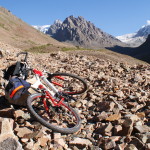
There’s a Plunder of Uranium in Them Thar Hills
story and photos by Kirsten Koza
(first published in Perceptive Travel Magazine – USA)
My travel insurance provider said Kyrgyzstan was a “no-fly zone” due to the revolution. Sergey, who’d been organizing my mountain bike ride across the Tian Shan Mountains, looked out his window in Bishkek and declared he couldn’t see a revolution. Regardless, media showed it to be gruesome, so nobody from North America would join me. My Kyrgyzstani cycling guide and I had spent the first two days cut off from our support vehicle and supplies by rockslides. We felt lucky to be alive and were now reunited with our driver and translator.
Alexey turned the 4×4 onto a dirt track but Kyrgyz nomads surrounded us, blocking our path. The nomads’ Mongol features were all malformed, faces too narrow, impossibly close set eyes; one of them in a crisp white shirt and tweed vest surely had Down syndrome. He shoved his head through Alexey’s open window and inspected my petite, blonde bike guide in the passenger seat and then, Cholpon, my pretty, young, Kyrgyz translator in the back beside me. His small eyes finally seized me. These men weren’t leering; they were sizing up livestock at a market. I hid my middle-aged breasts behind my knapsack and reached for my camera. If something was going to happen, I wanted to capture it. I was still haunted by the parting words of a magazine editor a few years back who’d threatened me as I left for Easter Island with, “No picture; no story.”
“No, don’t,” Cholpon covered my camera. “Alexey, please put up your window.” She transitioned from English to Russian to talk to Alexey and Yena and then back to English. “There’s something wrong with these men. They only speak rough Kyrgyz—they have just a rudimentary knowledge of language.” Kyrgyzstan had formerly been part of the USSR and most people spoke Russian, but these men didn’t, and apparently they barely had a grasp of Kyrgyz.
Alexey revved the engine. Alexey had grown up in Soviet times. His parents were rebels, so, instead of speaking to him in Russian when he was a baby, they only spoke to him in English. Two nights ago, between vodka shots, he’d asked me to imagine his first day at school—a Russian kid from Kyrgyzstan, in the USSR, and English was his first and only language.
The nomads ignored the urging from Alexey’s engine.
Cholpon was panicking. “Please, let’s get out of here. They’re primitive.”
This wasn’t just primitive. Why would every single one of them have obvious mental and physical afflictions? We were in the middle of nowhere Kyrgyzstan.
“Alexey, we need to go!” Cholpon hissed in my ear.
Two of the men banged the hood. They wanted us to take a tire up the mountain. Alexey indicated that the Toyota was packed with our camping gear and bikes and said “no.” He coaxed two deformed heads out of the window with the automatic window button. He nudged forward, pushing them and then gunned it leaving the primitive men and their wheel.
Ak-Köl, Lake of Secrets
Cholpon babbled about how terrifying they were as we drove through streams and gullies and swamps and headed up the tricky track until we reached a mind-blowing emerald, turquoise, and copper-green lake. Lake Ak-Köl hadn’t been on any of my maps, so Alexey marked it for me. The water shimmered like a chameleon as it reflected both the sky and the red, mineral-laden mountains that were dotted with trees. There was a plunder of riches in these hills. As we rounded the lake we came upon a ghost town of matching, dilapidated wooden houses with boarded windows. Alexey made a U-turn, and we headed back a short distance to set up camp on a patch of grass at the water’s edge.
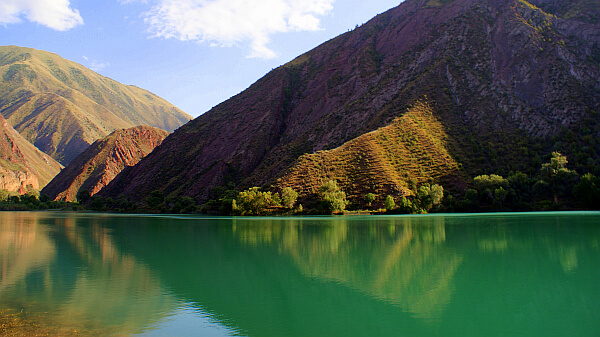 As we unloaded the gear, Cholpon seized my hand with an eagle claw grip. She pointed speechless with her other hand. Where had he come from? Marching past, looking dead ahead, in his crisp white shirt and tweed vest was the man with Down syndrome. He hadn’t even broken a sweat climbing the mountain on foot as fast as we had done in a 4×4. We all stared. His shirt still looked freshly ironed. Cholpon pleaded with Alexey and Yena that we leave. They told her to stop being silly.
As we unloaded the gear, Cholpon seized my hand with an eagle claw grip. She pointed speechless with her other hand. Where had he come from? Marching past, looking dead ahead, in his crisp white shirt and tweed vest was the man with Down syndrome. He hadn’t even broken a sweat climbing the mountain on foot as fast as we had done in a 4×4. We all stared. His shirt still looked freshly ironed. Cholpon pleaded with Alexey and Yena that we leave. They told her to stop being silly.
I decided to take photos of the lake and find a bush to pee behind while my guides argued. Alexey and Yena were irritated with Cholpon. They said she was overreacting. Cholpon was assigning supernatural powers to the man with Down syndrome. I didn’t like how he’d suddenly appeared. It should have taken him hours. I peed and looked across the lake as the distinct feeling of being watched crept along my arms with a gaggle of goose pimples. Then I heard voices from the far shore. No, maybe closer. There was laughter. I struggled to pull up my pants. I used my camera like binoculars but couldn’t see anyone.
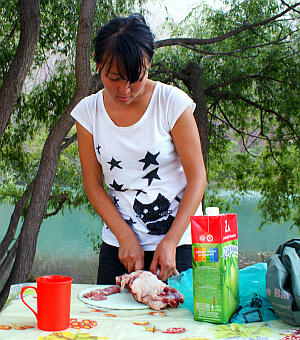 I rushed back to camp. Cholpon was crying and chopping up a chicken. Alexey was pumping up his air mattress in the van. Yena was erecting the tents. I poured myself a glass of wine and grabbed my laptop. “Yena, what’s up with Cholpon?” I asked.
I rushed back to camp. Cholpon was crying and chopping up a chicken. Alexey was pumping up his air mattress in the van. Yena was erecting the tents. I poured myself a glass of wine and grabbed my laptop. “Yena, what’s up with Cholpon?” I asked.
“Pfft,” Yena dismissed. “She thinks she is going to be kidnapped bride, like her sister.” I pictured Cholpon being carried away by a village of deformed men.
Cholpon had told me about her sister just minutes after she and Sergey had met me at the airport. Cholpon’s sister had attempted suicide to escape the family of nomads who’d kidnapped her. The nomads thankfully had brought her to a hospital which was how she got away. Sergey had seen my concern and assured me I had nothing to worry about because the nomads liked docile women (not me) who could also make kumis, fermented mares’ milk, and I couldn’t even milk a horse. He was kind not to point out that I was also too old.
Two men approached from the abandoned mining town, which I was suspecting, although boarded up, was far from abandoned. I hadn’t seen a sign of a woman. But they had to be here—doing laundry maybe? I wondered if they all shared the same mother and how many generations of incest this was. The men were asking Alexey for cigarettes. I took a photo.
“No!” Yena whispered motioning me to put my camera down. “And hide your laptop.” She dropped her jacket on my equipment.
The men stumbled back to the village. They looked like they’d been imbibing in something stronger than horse milk. They were met with whoops and war cries.
“Have you ever seen the movie, Deliverance?” I asked my guides. Alexey had a huge stack of DVDs of international films which he watched in the van while Yena and I biked. None of them had seen Deliverance. Dueling banjos dueled in my head. “It’s about a camping trip that goes wrong.” I chose not to tell Cholpon about the sodomy scene.
We ate, and Cholpon wiped a steady stream of tears from her face and actually drank some of my wine, which she didn’t do normally, being Muslim. This rule didn’t seem to apply to Kyrgyz men. Many embraced the Russian tradition; if you open the bottle of vodka, you finish the bottle of vodka.
Darkness devoured the landscape. And soon as it did the howls and cries of mounting excitement from the ghost town started to move in the blackness. We heard wolf cries and then lights flickered—lanterns had been lit as if on cue and were bobbing as they were carried from the village in single file along the far shore. Another line of lights snaked towards us. They were going to surround us. Maybe someone would be killed and then I’d have something to write about. Did I just think that?!
A Night Escape
“We’re going!” Alexey was pulling tent pegs. I could stop him. Sergey had said my guides were to do whatever I wanted. The villagers were circling. If I gave the order to stay, I’d definitely have something to write about. What would happen? Rape, murder? Cholpon was sobbing. She threw pots in boxes. A sensible wave of terror swept over me. What was I going to do, just stand there and take photos of a massacre on a mountain? Yena and I pulled down a tent.
“Hurry,” Alexey panted. “Don’t remove the tent poles. Throw it in the van. We’ll deal with it later. Don’t worry about the garbage!” That wasn’t like Alexey. “Fucking leave it for them.”
Their screams and lights were all around us. Yena and Alexey jumped into the front and Cholpon and I had to lie on Alexey’s air mattress in the back with the chaos of tents and gear. He spun the tires. We frantically locked the doors.
“Don’t get stuck, Alexey,” Cholpon cried and held my hand. That was my big fear too. We’d made our way through rivers and sucking mud in the daylight. This was treacherous at night. Nobody else knew where we were. We’d changed our route because of the landslides. There wasn’t cell service. Cholpon whispered in my ear, “Do you think they’ll rape us?” Yeah, I actually figured that might be the best case scenario. It was the murdering that had me even more worried.
I was exhausted the next morning. I sat with my feet in icy rapids. The water here too had a mineral rich hue. I’d hardly slept. Even though Alexey assured us we’d driven far enough from the not-so-abandoned mining town and its horror film of inhabitants, I couldn’t stop thinking about how the man with Down’s could appear from nowhere. Maybe there were shortcuts they knew. Yena handed me a cup of coffee. “Yikes,” I looked at the curdled artificial creamer.
“Yes, I don’t know why it do this,” she said.
It looked disgusting, but I drank it anyway. I was still perturbed by my dangerous urge of last night. I’d actually fantasized someone dying for writing fodder. Sure, there was a lot of competition out there for an exciting story, and not many of us were unfortunate (or fortunate) enough to have to hack off an arm to survive, or be taken hostage in Afghanistan, but for me to wish for something like that was as gross as the paparazzi who took photos of J.K. Rowling’s crotch when she was enjoying a day at the beach. No, maybe not that gross, because I’d never take a photo of a children’s author’s privates…perhaps John Grisham or Dan Brown in a Speedo—but not to sell.
I went for a second cup of coffee. I sniffed the powdered creamer. Could anything even go wrong with the stuff? I spooned it into the cup of instant coffee. It curdled. I sipped it again. It tasted okay. Perhaps it was the PH of the antifreeze-green water. Cholpon had filled our water containers at Ak-Köl.
“Nobody Lives There”
Yena and I had been biking all day along a two-track. We were lost. Somehow we were going to have to find Cholpon and Alexey with no cell service. Just ahead was a red Mercedes and several generations of Kyrgyz males packing up their fishing tackle. They agreed to give us a lift. As we took the wheels off our bikes to fit them in the trunk, they wanted to know where I lived in Canada and why I was here during a revolution.
One of the men was an executive at a Belgian mining company. Yena told him about Ak-Köl. He kept saying, “No.” The rest was Russian. I looked at Yena to translate.
“He said nobody lives at Ak-Köl. He said it’s closed. The lake is contaminated with uranium.”
Visions of my curdled coffee swirled before me. I’d been drinking uranium while imagining taking dirty photos of John Grisham and Dan Brown.
Four years later, Cholpon, Sergey and I are sitting in an exotic, tented restaurant in Bishkek. The white fabric billows in the summer breeze which carries the scent of grilled meat and fresh bread. I’m back. I’m here to photograph Kyrgyz nomadic life—the horse games, eagle hunters, markets, yurts, and food.
“When I teach tourism classes in the winter, I always tell the story of Ak-Köl.” Cholpon hands me a skewer of sheep meat. “Nobody believes me.”
“That’s weird,” I agree, “because when I’ve told the story, I’ve had people deny that anyone lives there and even say there is no such lake. Maybe I should return. The lake is killing people. That’s got to be why they’re all deformed.”
“You can’t,” Sergey says. “It’s forbidden. It’s closed. Nobody lives there.”
I have the distinct feeling that people do still live there. My pulse quickens. They are hiding in the hills, camouflaged like their toxic chameleon of a lake.
_____
Kirsten Koza is an author, humorist, and journalist. She edited the Travelers’ Tales anthology Wake Up and Smell the Shit: Hilarious Travel Disasters, Monstrous Toilets and a Demon Dildo, and she is the author of Lost in Moscow: A Brat in the USSR. Always looking for her next adventure, Kirsten has covered topics (for newspapers, magazines and anthologies worldwide) such as tornado chasing, cannibalism, insect eating, mummies, Putin, gluten, and body disposal. See more at www.kirstenkoza.com.
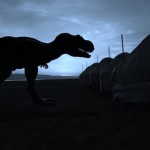
A nipply night in nomad’s land.
By Kirsten Koza
(First published in the book, The Best Women’s Travel Writing, Volume 8: True Stories from Around the World)
“Oh, no, Kirsten!”
My Kyrgyzstani guide’s warning came too late, and stepping in poo had never felt so good. My cycling shoe sank into the dreadful yet luxurious warmth of fresh animal dung. I was chilled to the point where I was actually lingering ankle-deep in feces, by choice.
Yena shone the light of her cell phone, its only feature that was still working, onto the molten mound enveloping the bare skin of my lower leg. The droppings looked like something a brontosaurus might have deposited. A meteorite seared across the night sky, so close that you could actually hear it crackle as it hissed down the vertical gorge to the Chong-Kemin valley.
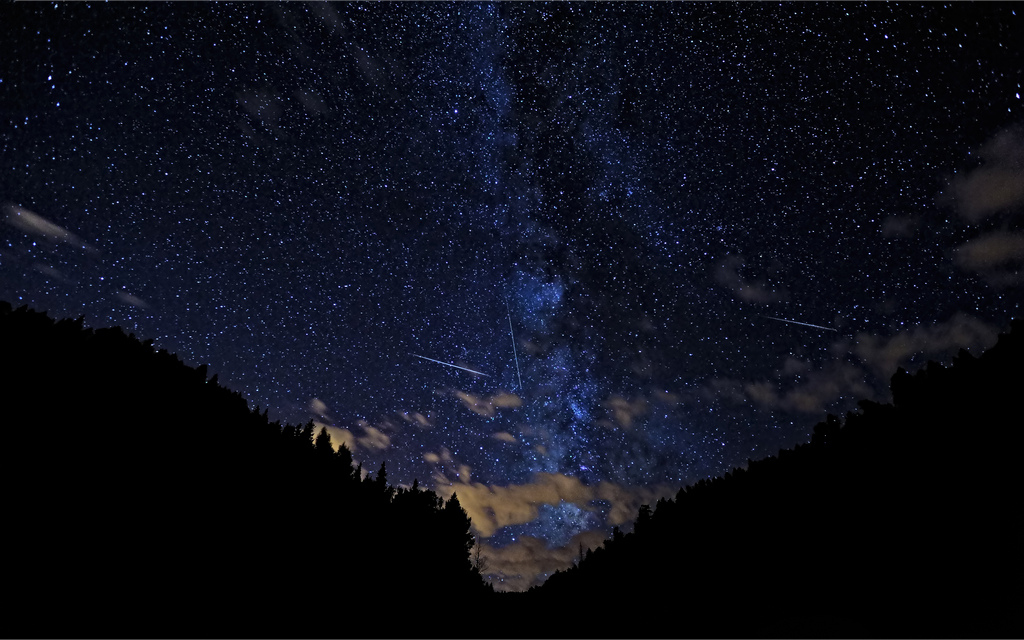
The point of light from Yena’s phone caught me in the eyes. When I’d first met her, yesterday, after traveling thirty-six hours from Canada, I’d told her that I had two irrational phobias. The first one—fear of the dark—I fabricated as an excuse for not wanting to climb the unlit, steep, winding stairs of an eleventh-century minaret. I wasn’t worried about the lack of lighting; I was being lazy. The second phobia—which I’d added to brighten the mood after she looked disappointed that I didn’t want to go up the tower—was real: I was terrified of meteorites. I was seriously scared of being struck by a shooting star. I’d lie in bed at night imagining them out there in space.

Now here we were on a mountain, in the dark, unable to make it across the pass with our bikes because a fresh rockslide had strewn unstable boulders and scree for several kilometers in every direction, including on the slope directly above us. We’d had to turn back and were descending on foot from an altitude of four thousand oxygen-deficient meters above sea level, as night smothered Chok-Tal Mountain. The blinding dark was being shredded by the Perseid meteor shower—shooting stars so close it seemed I could even smell their trails of smelting iron and sulfur. I snuggled into the poop.
“Yena, why did the old Kyrgyz nomad ask me if I was afraid of wolves?”
“I no know why. Is very strange.”
It was weird. It was the only thing he’d communicated, as we’d left his family’s yurt in the afternoon to head up over the mountain chain. He had a wind-whipped and sun-lashed face, a riding crop, a long white moustache, and a traditional white felt hat that made him look like he was wearing a small yurt on his head.
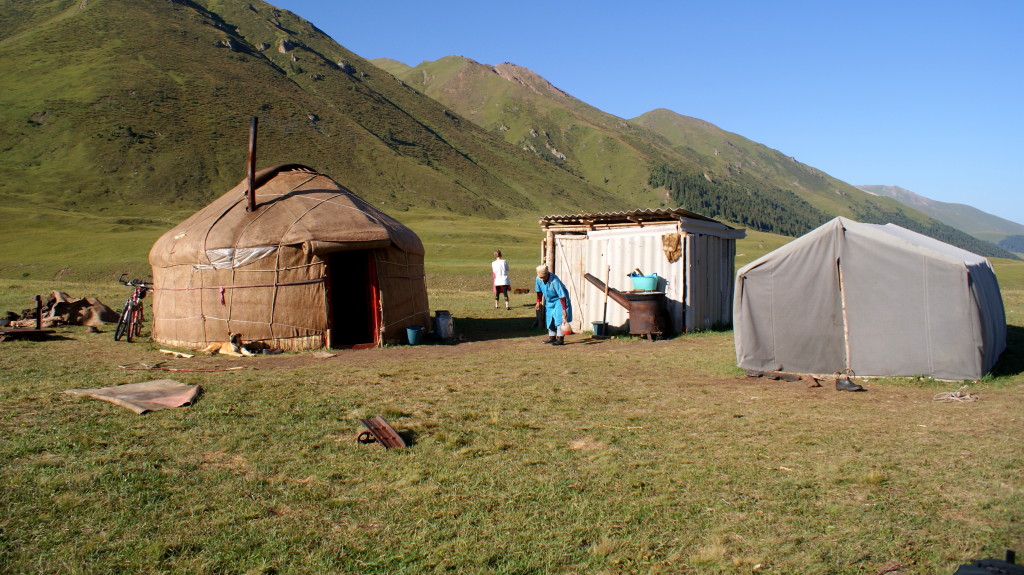
“I’m not scared of wolves,” I said to Yena as she skidded away down the rocky trail beside her bike.
“I know, you say dis already.” Just a few feet ahead of me, and she was invisible.
Suddenly, she shrieked. A clatter of falling rocks started above us and immediately bounced and slid past on all sides. Stone and shale tumbled over the sheer precipice.
I screamed. I didn’t know what was going on, but screaming felt right.
“A horse!” Yena cried.
“Oh, God. Did it go over the edge?”
“It go off.” My guide was somewhere near the edge of the gorge. I couldn’t see her.
“It went off the edge?” All I could hear were the glacial rapids roaring thousands of meters below.
The light from my twenty-two-year-old guide’s phone darted around the nearby mountainside. There was nothing to see in its beam but rocks balancing on good will.
I was too old for this.
Wait, did I seriously just think that? I was furious with myself for even entertaining such a thought. I was not too old for this. I was forty…something. Mid-forties. I’d been lying about my age, saying I was older than I was, for so long that I’d actually need to do the math to figure out my real age. I had never understood why movie stars claimed to be younger than they were. If you lie up in age, then people are amazed by how good you look. But today’s mistakes were those of a twenty-two-year-old. I’d made such errors in judgment decades ago and there was no excuse for repeating them at forty-five-ish.
We had no water, food, supplies, flashlights, or gear of any kind. Everything we needed was in our support vehicle with our driver, Alexey, and my Kyrgyz cultural guide, Cholpon. Everything that could save our lives was on the other side of this snowy mountain range, a six-hour car ride away—if we had a car. When the sun vanished, the temperature had plunged below freezing, and I was wearing shorts and a t-shirt. I’d suggested turning back hours ago, when I’d begun to suspect that I’d misunderstood the plans for the day; I didn’t want to get caught high in the mountains at night.
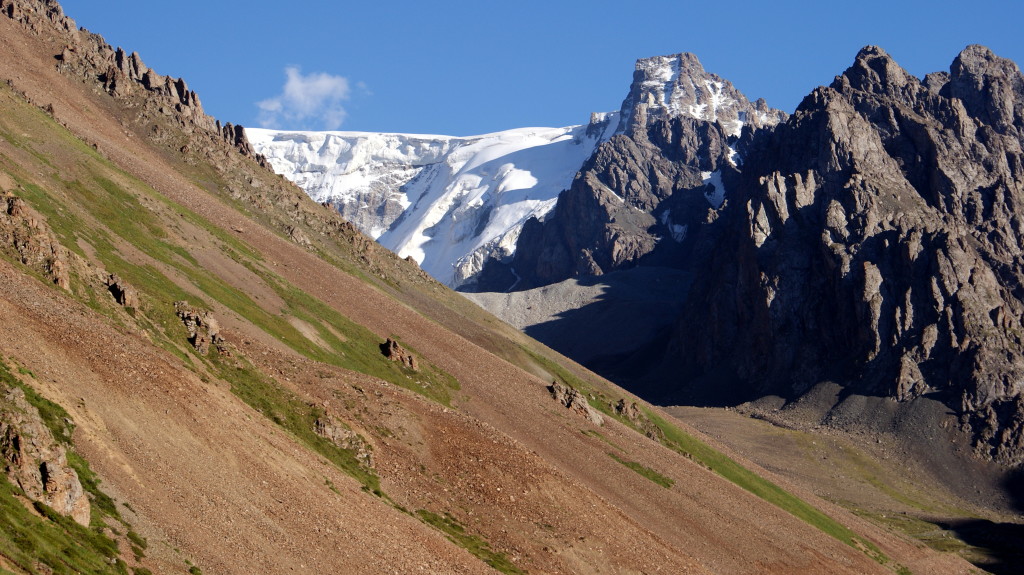
“Hello, Alexey, hello….” Yena tried her useless walkie-talkie and her useless cell phone for the hundredth time. I knew she was just putting on a front for me. She was fully aware that there was no cell service here, and the transceiver radios were only good if you had a line of sight with the other person. “Hello…” Static.
There had been a tense fight last night at camp between my guides. Alexey had said—in English, for my benefit—“The lady is tired and she has come from living at sea level. We are too high in elevation. Change tomorrow’s ride. Do a small ride, Yena. Don’t cross the mountains.” I agreed with Alexey. Then the arguing continued in Russian, the common language of the three guides supporting my bike trip across Kyrgyzstan.
I didn’t normally travel with a team of babysitters. I’d hired them all before arriving in Bishkek, back when I assumed I’d have a group of cyclists accompanying me. But it turned out nobody else in the world wanted to come to Kyrgyzstan, mostly because of a recent revolution and government overthrow and killings. I’d even received death wishes from an Arizona prison guard on an online mountain biking forum for daring to invite Westerners to a Muslim country. He’d lusted for guns pointed at my head.
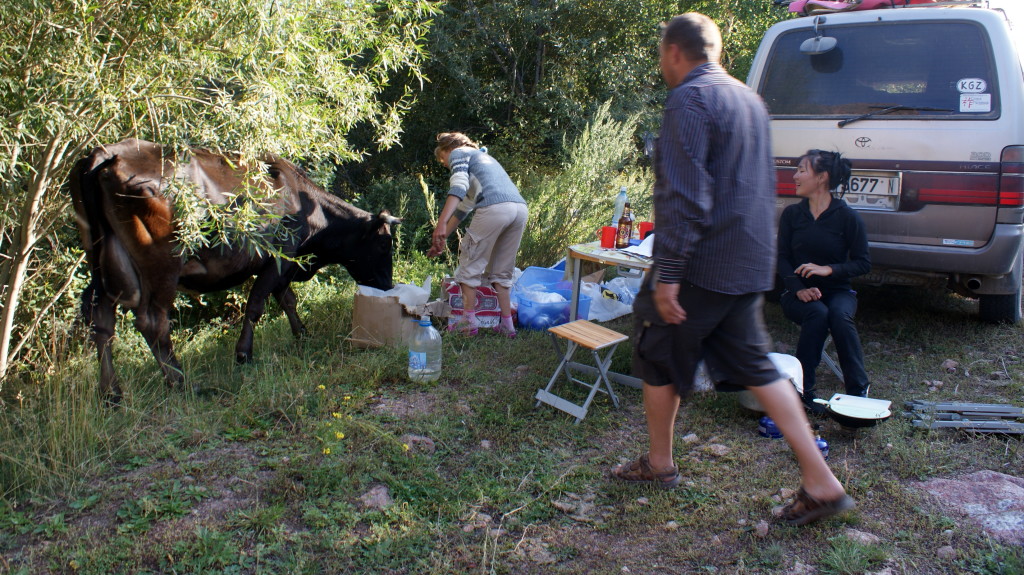
Maybe Yena hadn’t understood Alexey’s English when he said we shouldn’t cross the Celestial Mountains. She spoke Russian and French. I could barely understand a word of her English and none of her French, and I was beginning to think she didn’t understand my English, either. Or perhaps she’d won the argument, and nobody thought to tell me. But when we’d left so late in the day, and when I’d watched her hand two bottles of water back to Alexey, complaining they were too heavy – these two clues had indicated we were doing a shorter, easier ride, and not crossing the mountains. She’d even thrown out our food, at which point I was completely certain we’d just be doing a quick jaunt.
Four hours later, when I was vomiting horse milk, clambering over rockslides, carrying, pushing and dragging my bike continually upward, I realized we were doing the full mountain crossing.
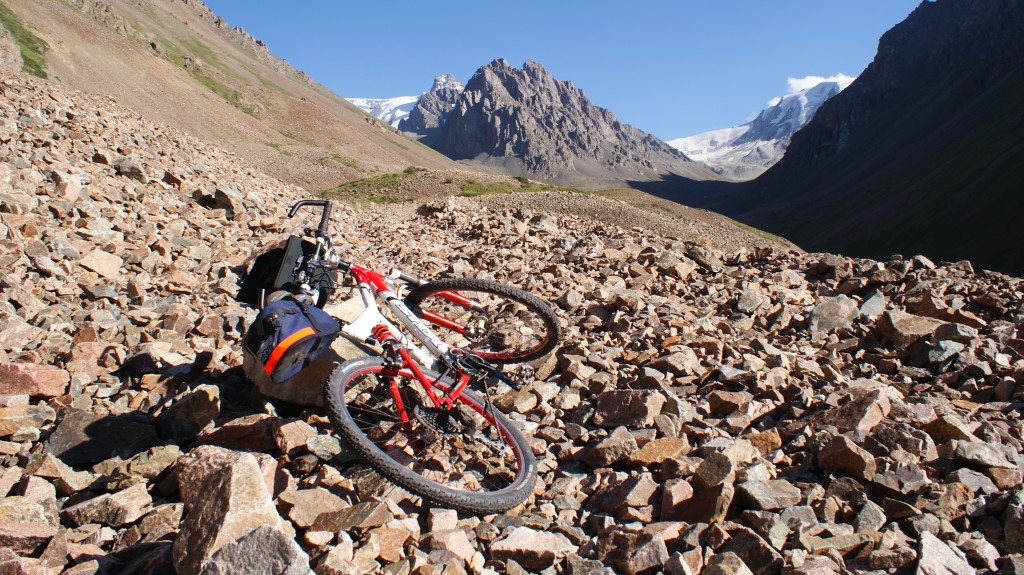
Now, one foot in front of the other, defeated, we were feeling our way back down the mountainside, trembling with cold and muscle fatigue. The incline was so vertical that I was using my bicycle brakes to help slow my pace. I winced as a rock tore the skin off my shin, and again as a shooting star whizzed in front of me. I didn’t make a wish. I wasn’t superstitious. I was just fully freaked out.
The nomads, though—they were superstitious. The Kyrgyz woman who’d served us fermented mare’s milk and bread with jam and clotted cream in her yurt this afternoon had stared at my upside-down bread on the table and shot me a look of horror. I’d also pointed with my foot at her adult son. I was showing him the hardware that attached my shoe to my bike pedal. He’d jumped back and protected his face with his hands. You’d have thought I was going to kick him in the head.
Before traveling to Kyrgyzstan, I’d been sent a warning list on how not to offend or upset the nomads. One of the items on the list said, “Do NOT put your bread upside down on the table,” and the other said, “Do NOT point at anyone with your foot.” I’d cursed the Kyrgyz family with bad luck and brought the devil into their yurt and now I’d startled one of their horses to its death. Maybe they wouldn’t notice. They had lots of horses.
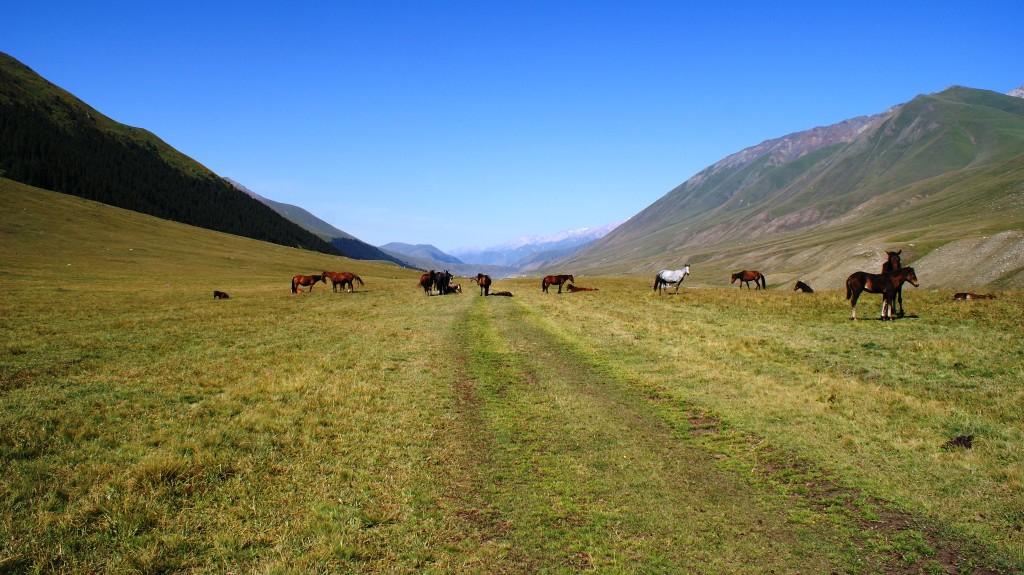
“We leave the trail, now. Here. Here. See light. Is yurt. We go there.” Yena pulled my handlebars to direct me off the trail toward a wavering speck of light in the far distance.
“What? No.” Leaving the trail was insane. Bad things happened when you left the trail. Besides, if we stayed on the trail it would lead us right back to the yurt we were at today. Unless the light was coming from the first yurt we’d stopped at earlier in the day, not the second one.
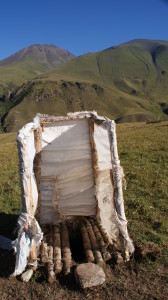 At the first yurt, a nomad woman had made cheese balls with her bare hands, and I could see her dirty handprints in the sour cheese. My stomach turned at the thought of putting it in my mouth. I pretended to enjoy my golf balls of cheese but palmed them into my pocket, intending to drop them in the outdoor toilet. But when I went to the squat latrine, I realized my cheese balls would be visible to anyone who looked in the shallow hole, so instead I feigned washing my hands in the stream and ditched the cheese there. They instantly sank to the bottom and stayed. The nomads had probably found my cheese after I’d left. They’d know it was my cheese. I didn’t want to go to the first yurt, but then I’d insulted the nomads at the second yurt as well. Plus, there was the issue of the horse.
At the first yurt, a nomad woman had made cheese balls with her bare hands, and I could see her dirty handprints in the sour cheese. My stomach turned at the thought of putting it in my mouth. I pretended to enjoy my golf balls of cheese but palmed them into my pocket, intending to drop them in the outdoor toilet. But when I went to the squat latrine, I realized my cheese balls would be visible to anyone who looked in the shallow hole, so instead I feigned washing my hands in the stream and ditched the cheese there. They instantly sank to the bottom and stayed. The nomads had probably found my cheese after I’d left. They’d know it was my cheese. I didn’t want to go to the first yurt, but then I’d insulted the nomads at the second yurt as well. Plus, there was the issue of the horse.
Following Yena, I stepped off the trail onto an impossible incline of slick wet grass. I turned my bike wheel sideways, as not even the brakes helped stop the downward slide. My front tire suddenly plunged straight down and stopped.
“What’s that?”
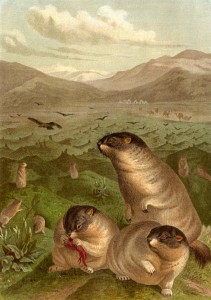 Yena shone her cellphone light. It was a marmot hole. She cast her light over the slope. Between where we stood and the far-off flicker from the yurt was a minefield of marmot holes, all just several feet apart. Before leaving for Kyrgyzstan I’d learned that the marmot was the second deadliest creature known to man, but that was because the marmot carried the flea responsible for the Black Death, or Bubonic Plague—not because their holes were waiting to trap and snap your leg bones like twigs.
Yena shone her cellphone light. It was a marmot hole. She cast her light over the slope. Between where we stood and the far-off flicker from the yurt was a minefield of marmot holes, all just several feet apart. Before leaving for Kyrgyzstan I’d learned that the marmot was the second deadliest creature known to man, but that was because the marmot carried the flea responsible for the Black Death, or Bubonic Plague—not because their holes were waiting to trap and snap your leg bones like twigs.
Using my bike like a senior citizen’s walker, I inched my way down the hill as slowly as possible. It was still too fast. A compound fracture out here would mean certain death. I wasn’t going to die at the hands of Muslims, as the Arizona prison guard had been desperate to prove—I was going to die by marmot.
Just then I became aware of motion, black moving against black, and far too large to be a marmot.
“Yena, what’s that? There’s something out there. No, not something, lots of things.”
We were being surrounded. Large shapes were closing in on us.
“I no know,” Yena whispered.
“Oh, it’s just cows,” I said, relieved.
Except that right then, we heard a deep, guttural, angry growl above us on the mountain. A T-Rex-sized beast was roaring and approaching fast.
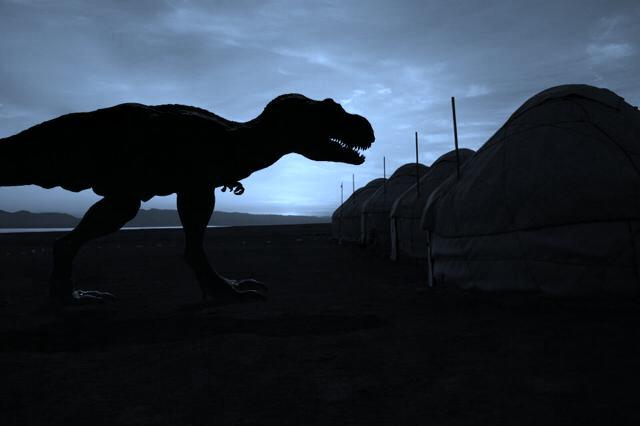
“Bull,” Yena cried out in dismay.
The bull circled. I couldn’t see it, but I could hear its hefty hooves impact the soil. It started to paw. It was going to charge. Yena and I made a barricade with our bikes. I heard myself panting—tight, short, breaths that sounded exactly like The Blair Witch Project whimper puffing. People really did make that silly noise. I couldn’t stop doing it. The Minotaur was bearing down on us. We’d be gored.
In a split second, the bull rounded our makeshift bicycle-fence. We were now on the same side of the bikes as him. Yena fumbled with her phone and the weak ray hit the bull’s eye. He charged. We scrambled around our bikes and held them in front of us, sidestepping with them, our bikes locked together in a panicked tangle of handlebars and spokes. I closed my eyes, bracing for impact. He thundered past and around us again. We were an awkward, gasping, four-legged matador.
“Call the nomads to help us,” I begged Yena.
She cried out in Russian, shouting her pleas toward the swinging lantern that marked the safety of the nearby yurt. Then all of a sudden, Yena let go of her bike and ran at the animal—all eighty pounds of her, shrieking threats as she waved her arms over her head and hurtled toward the horned mass of muscle.
I heard men’s voices to my right, speaking in Kyrgyz.
“Help us,” I whinnied.
Where were they? I was still making that pathetic whimpering-huffing noise.
A shepherd whistled a command. A lantern was lit. Dogs. Dogs and nomad men. Muslims. Muslims with guns. I was so happy to see Muslims with guns.
We were ushered into the family yurt. It was the second yurt.
“Kumis?” The mother offered me mare’s milk that had been fermented in a smoked goat’s stomach, again. I’d been up-chucking her kumis all day. Even in my dehydrated state, there would be no swallowing horse milk; the alcohol content was too low to be worth the risk.
I declined politely as Yena spun our adventure to the nomad woman who poured me the traditional half-full cup of tea, which I drank in one gulp. This happened ten times in a row. I wished she’d just pour me a full cup of tea. I wasn’t superstitious.
Her eldest son, whom I’d pointed my foot at earlier, eyed me from under his pile of colorful quilts. It was midnight, and the family lay on the floor, shoulder to shoulder. Where would we sleep? I wasn’t entirely comfortable wedging myself between the nomads on the ground; maybe I could spend the night huddled with the manure-burning stove and the teapot.
“I tell her about rock slide,” Yena said. “I tell her we cannot cross the pass and she say she know this. The same thing happened with Germans on bikes. They come down the mountain last night and sleep here.”
The nomad woman smiled at me with her gold teeth.
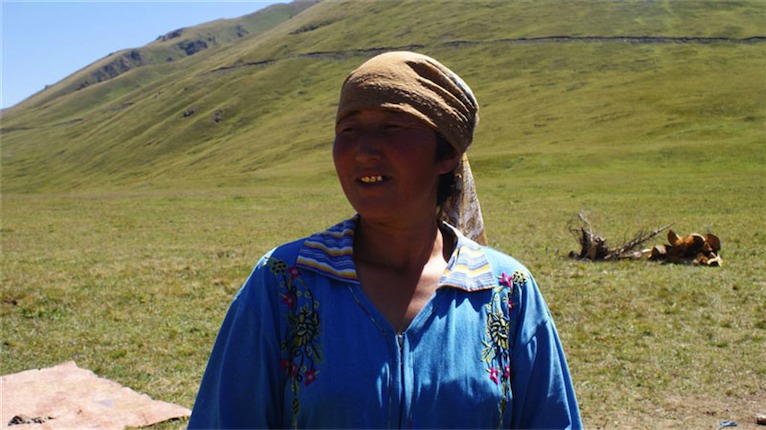
“Why didn’t she tell us that this afternoon?” I asked.
“I know. I no know. Is strange,” Yena replied. “We go now. They make bed for us in barn yurt.”
I was so thirsty. I hadn’t had nearly enough half-cups of tea, and as I followed several nomads back out into the freezing night, to the “barn yurt,” I was shaking with the beginning stages of hypothermia. My teeth rattled in my skull. Yena wrapped her icy, spindly arms around me. I don’t like being touched, but I could feel the warmth from her heart on my back, so I didn’t pull away. We shook together as nomads kicked the dogs out of the barn yurt and moved saddles, boots, and riding tack.
“I d-d-don’t mind d-dogs,” I chattered. The dogs ran off into the darkness in a barking frenzy, chasing something unseen.
Yena was handed a lantern, and we stepped into the yurt. I took off my poopy shoes—not that it mattered in the barn, but the nomads were superstitious about shoes—and one tipped over on its side. That was bad luck, too. Now I’d brought bad luck to the barn, as well. I quickly righted my offensive cycling shoe, but not before it was noted by the old man.
On the ground was a mat for us to share. Yena snuffed the lantern, and we crawled under the mountain of handmade blankets on the felt mat and spooned for warmth, feet of course pointed to the flap of the door, for luck. I heard the flap move, and then something else.
“Something is in the tent with us,” I whispered.
“No,” Yena answered.
Something sat down. “Maybe a dog came back,” I suggested.
The dogs responded by barking maniacally in the distance.
“Yes, something is in here,” Yena agreed.
We heard scratching. “Dog,” she sighed.
I suddenly had the feeling that it wasn’t a dog. It was the wolf. But I wasn’t afraid of wolves, I told myself.
Then I coughed. It was a horrible racking cough. Yena rubbed my chest.
No, she was rubbing my boobs. Yena was rubbing my breasts.
O.K., this was worse than wedging in with the family. Did she think I was paying for this service along with her guiding skills? It was beyond awkward.
“Yena,” I coughed, “I’m not scared of shooting stars anymore.” I barked painfully.
“Dis is good.”
“Yeah, now I’m scared of pulmonary edema.” I could feel my lungs filling with fluid. I choked on mucus. Yena rubbed my boobs again.
Day one was over—I hoped. But there were three more weeks to go.
________
Kirsten Koza is an adventure writer, speaker, and the author of Lost in Moscow. Her articles and photographs have been featured around the world in books, newspapers and travel magazines. Kirsten has mountain biked (badly) across twenty countries, was rewarded with a ham for the first mountain bike ascent up Romania’s Mt. Cocora, has driven the intercept vehicle tornado chasing for 19,900 kilometers, kayaked inches from alligators, was held at gunpoint in Honduras for twelve hours, was tattooed by a Rapa Nui tafunga, and has put testicles and penis and many other unusual food items in her mouth. To see pictures and read more about Kirsten’s misadventures visit www.kirstenkoza.com
*I have spelled Elena, Yena, throughout, as that was how I was instructed by her to pronounce her name. Alexey pronounced it Lena and Cholpon said it like Elena.
T-Rex added with Efexio.
This story was first published by Travelers’ Tales, in the 8th volume of The Best Women’s Travel Writing, a series of anthologies edited by Lavinia Spalding. (Click here to see the book on Amazon.)
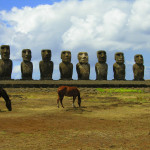
Easter Island and the Chilean with the Brazilian
When a family adventure unexpectedly turns X-rated
BY KIRSTEN KOZA
My obsession with Easter Island’s mysterious monolithic stone statues started when I was around five-years-old after I’d seen the film Chariots of the Gods. In the movie, aliens had helped the natives of Easter Island erect stone monoliths called moai. Of course I now know that aliens had nothing to do with the moai—I mean, come on, if extraterrestrials could build a space ship to fly across galaxies, surely they’d do something else with their spare time besides helping scantily clad Polynesians carve rudimentary cement-truck-sized statues on one of the most remote inhabited islands in the world, 3686 kilometers off the coast of Chile.
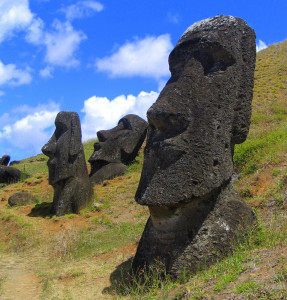 Finally, forty years later, I was hiking up Rano Raraku volcano, the birth place of the moai, with my seven-year-old son, Rigel. I pulled my collar up to protect my neck from the ruthless sun and pulled my hat down over my face to hide my already blistered lips. No shade in sight, the Rapa Nui natives had eviscerated the island of trees to transport their statues across the volcanic terrain. I recognized individual moai from Thor Heyerdahl’s book. I was about as close to Nirvana as I could get. Rigel and I continued up slowly.
Finally, forty years later, I was hiking up Rano Raraku volcano, the birth place of the moai, with my seven-year-old son, Rigel. I pulled my collar up to protect my neck from the ruthless sun and pulled my hat down over my face to hide my already blistered lips. No shade in sight, the Rapa Nui natives had eviscerated the island of trees to transport their statues across the volcanic terrain. I recognized individual moai from Thor Heyerdahl’s book. I was about as close to Nirvana as I could get. Rigel and I continued up slowly.
“Can we go to the beach now? It’s hot,” Rigel gasped.
I looked at his little scarlet face and then the giant moai lying stacked upon one another, still in the midst of being carved out of the volcano’s walls but frozen in process by an outbreak of tribal war, which was followed by despair and cannibalism, and then an invasion of slave traders in the 1800s. “Yeah, O.K.,” I agreed. We had three weeks here, so no rush. I’d hang with Rigel. I looked around for my husband, Malcolm, and my friend Karen who’d gone ahead.
Rigel and I descended the dust-slick rock path. We ended up stuck behind two Chilean women in high-heeled beach sandals (stiletto flip flops). Their skirts were flapping in the strong breeze and their tight-jeaned man, equally encumbered by his attire was failing dismally at helping either lady down the slope.
“Excuse me, excuse us,” I said as Rigel and I skidded past the traffic jam of frills and girly-girls clutching their cologne soaked he-man.
As I helped Rigel climb down a steep rock below one of the Chilean princesses, her dress blew up like Marilyn Monroe’s—except this wasn’t family rated. I saw Rigel’s face blanch and his pupils dilate.
Rigel leapt towards me, grabbed my hand, and pulled me down the steep incline at break-neck speed. “Why did that woman’s vagina look like that?”
Oh, God.
“Her vagina hair was just a thin black stripe,” Rigel said in shock.
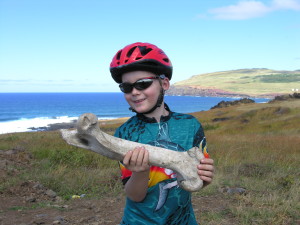
I hoped this was not going to be his first journal entry in his Easter Island Diary that he was bringing back to his grade one teacher and class. As it was, the teacher disapproved of me taking Rigel out of school for a three week trip. She thought his life might be adversely affected by missing that much cut and paste and carpet time.
“Did her hair on her vagina grow into that shape?”
“No, she’s had it waxed.” Shit.
“Like a car?” Rigel asked. “Is that why her vagina was so shiny?”
“No, that was tanning oil or something.”
“Why would she want a wax and tan on her vagina?”
“Rigel, you see that moai over there. His name is El Gigante and he weighs over four hundred thousand pounds.” I pointed to the resting giant. “He was someone’s real great great-great granddad, as all the moai were shaped and carved for real Rapa Nui people.”
“Where is she from?” Rigel inquired.
“Huh?” I looked at El Gigante. It would have taken an entire tribe or clan a whole year to carve this.
Rigel tugged my arm. “What country is that woman from?”
“She’s Chilean,” I said.
“Do people from different countries have pubic hair that grows in different shapes?”
Oh, great. “No, she’s had most of her pubic hair removed.” I stopped myself from going any further. We were at one of the world’s greatest archaeological wonders and I wasn’t about to give my son a lesson on bikini waxing styles.
“Can you pick the shape you want your pubic hair to be? Do you ever do that to yours?”
“No!”
“Hers was a zebra.”
“It was a Brazilian,” I said.
“Why would a Chilean want a Brazilian on her vagina?” Rigel asked.
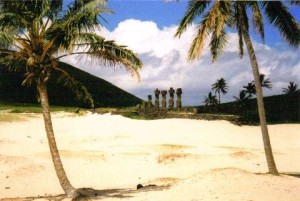
Later, my friend Karen and I stood in the soft white sand below the moai, at Anakena beach, while my husband took over cooking lunch in a large Rapa Nui woman’s beach kiosk. Anakena was where the Rapa Nui canoes had first arrived, after their treacherous 3900-kilometer paddle across the South Pacific, from the Marquesas Islands. Rigel ran around impatiently as we took pictures.
“I can’t believe we’re here,” said Karen. “It’s incredible. I never fathomed the size of the monoliths or how hard it must have been to transport them around the island.”
“Karen,” I whispered. “It’s a good thing you educated me on all the varieties of pubic epilation the other day. It came in handy at Rano Raraku.”
“Why?” Karen asked, moving her sunglasses down her nose to look at me.
“A couple of Chilean women were going commando and Rigel had frontal view of beaver.”
Karen laughed. “So which style was it?”
“It was a Brazilian beaver.”
“Full? As in the naked Sphinx?” Karen inquired.
“No, there was a landing strip.”
Karen laughed even louder. Hey, Rigel,” Karen called. “Did you know that one of the statues’ hats weighs as much as two elephants?”
Rigel ran over. He was excited. “Mom, Karen, guess what?”
“What?”
“That Chilean woman is here!”
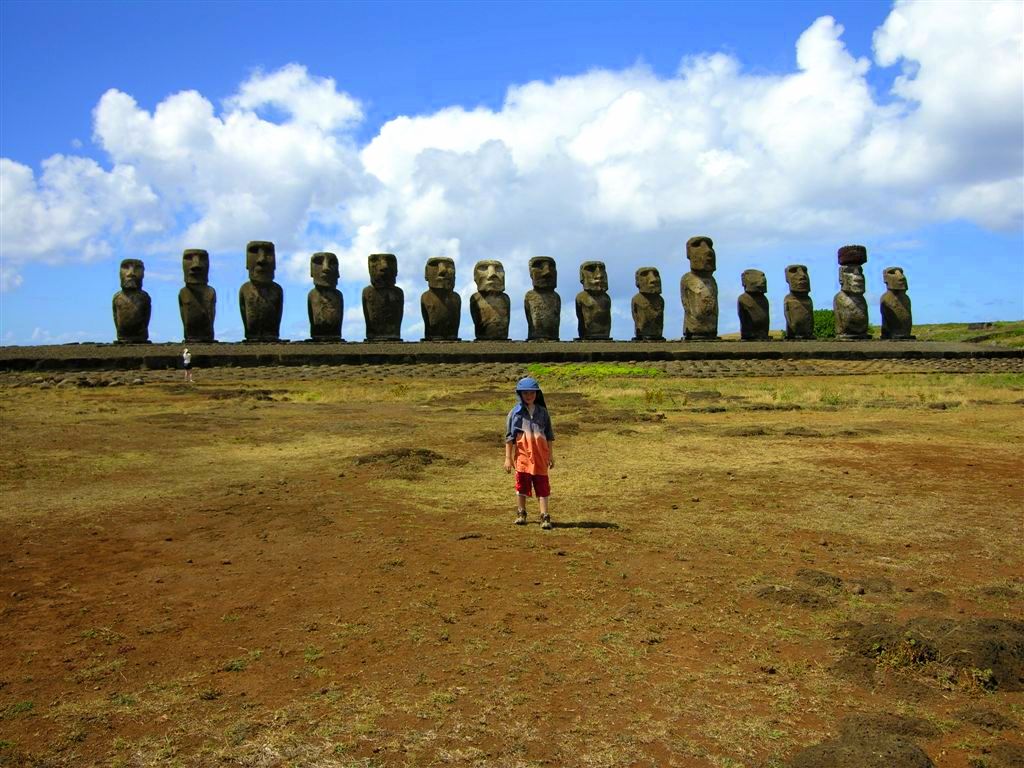
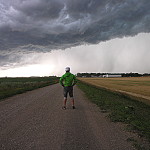
(This story of Kirsten’s was published in the Travelers’ Tales series of books The Best Women’s Travel Writing volume 9)
Chasing Tornadoes: “The Suck Zone. It’s the point basically when the twister… sucks you up.”—Dusty from Twister
BY KIRSTEN KOZA
“Go, go, go!” Ron bellowed. He must have sensed my hesitation.
Was I supposed to pull a one-eighty and drive away from the tornado or actually haul ass through a Nebraskan cornfield toward it? Then the twister flickered and was gone.
“It’s coming back,” Ron yelled. “It’s going to come down on the track right in front of us!” And then it did. A full vortex. “GO! Towards it!”
I stomped on the accelerator pedal of the intercept vehicle, a hail-dented little Pontiac Vibe. We were doing eighty in a cornfield. Getting stuck was not an option.
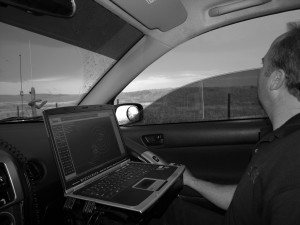 The Star-Trek sounding computer-voice on Ron’s laptop said, “Warning. You are approaching severe weather.”
The Star-Trek sounding computer-voice on Ron’s laptop said, “Warning. You are approaching severe weather.”
We were approaching my first tornado, now just 500 feet in front of me. The dark, jagged cord of wind looked like it could loop and lasso me from my seat. Now 200 feet. I thought about the tornado in the Wizard of Oz—it was made by spinning a black sock. It was ingenious and inexpensive. I was living a movie, a nightmare, and a dream come true. My heart pounded in my temples. This was real.
“Gone.” Ron slammed his laptop shut. “There was another one there on the hill as well. So what did you think?”
I whooped my reply cowgirl-style. It was time for a bar, drinks, dancing, screaming, bloody steaks, mashed potatoes, do the twist.
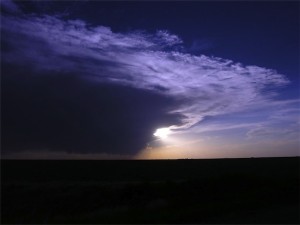 It was the last day of the storm chase, and I’d driven 12,365.3 miles through the summer while Ron Gravelle, storm predictor, forecaster, and certified chaser, navigated us to the best storms across the United States. The weather had been a storm chaser’s worst nightmare, sunny and dry. Yet Ron overlaid hundreds of weather maps and found a variety of extreme conditions: killer fork lightning in Louisiana, an isolated cell in New Mexico with a cactus and canyon backdrop, a Kansas storm that looked like it could plough a house across a field, a front in Colorado that resembled an alien ship from Independence Day. I’d finally seen my first tornado. But not my last.
It was the last day of the storm chase, and I’d driven 12,365.3 miles through the summer while Ron Gravelle, storm predictor, forecaster, and certified chaser, navigated us to the best storms across the United States. The weather had been a storm chaser’s worst nightmare, sunny and dry. Yet Ron overlaid hundreds of weather maps and found a variety of extreme conditions: killer fork lightning in Louisiana, an isolated cell in New Mexico with a cactus and canyon backdrop, a Kansas storm that looked like it could plough a house across a field, a front in Colorado that resembled an alien ship from Independence Day. I’d finally seen my first tornado. But not my last.
“So, you heard what happened with Ben and the thirty thousand dollars at the border?” Len, the South African stock car racer, asked me when we picked up the SUVs at Will Roger’s Airport in Oklahoma City.
It was four years since my first chase, when I had—upon whim—begged Ron to take me on as a driver to pursue extreme weather, one of the things that both frightened and fascinated me most on the planet. Now I was back in Tornado Alley, the expansive swath of the United States between the Rockies and Appalachians, stretching from North Dakota all the way south through Texas. I was here with Ron again—he’d been hired by a television network from Hong Kong for a ten-day storm chase and had asked me to drive for him. Ron was sporting a t-shirt that showcased a spectacular Colorado tornado, an image of his that had been published in National Geographic. I desperately wanted to take a picture like Ron’s. That was the only problem with being an intercept driver—less opportunity to shoot photos. But it was also the only way I could afford to keep doing this.
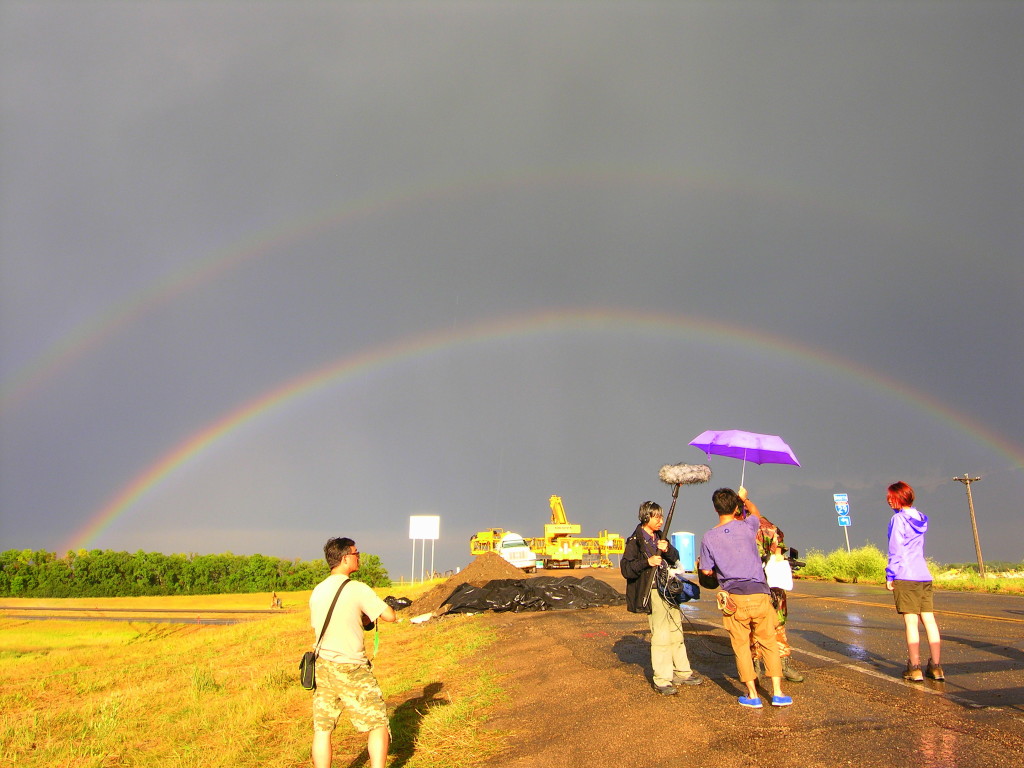
Ron handed me a set of keys to a brand-new silver Chevy Suburban, extra-long. I’d already heard the story from Ron about his brother-in-law Ben and the thirty thousand dollars. “He had loose change in his pocket,” I said, “which put you guys over your limit of ten thousand each in cash that you could bring in from Canada. But I can’t believe the border officials seized the entire thirty-grand because of a couple coins? Freaking disaster.”
Stock-Car-Len grappled me in a bumper-grinding hug. There was nothing sexual about it. “The entire trip budget, gone,” he said, shaking his head, “and all Ron has is a little slip of paper so maybe he can get it back from someplace in Canada. Those machines at the airport can see what you’re carrying.”
Later that morning we made our introductions with the Chinese celebrities and film crew in the lobby of the airport Ramada.
Keiky, the scriptwriter, shook my hand, “Nice to meet you. This is He.”
“Who?”
“He.”
He shook my hand. He was China’s George Clooney.
“And this is “Lawlaw Law.” Law had evidence of a former harelip. His job was to report on his colleagues, back to China.
It was our turn to introduce a few of the storm chase team. “This is Ben, Len, and Jen.” Nine Asian faces stared at us in disbelief.
Soon our trio of storm-chase SUVs was on the highway and heading away from Oklahoma where the weather was going to remain sunny and dry for a week. Stock-Car-Len overtook us slowly so that Ron’s cameraman, Ben, could film us. As they passed, I waved to Justin, a student from Singapore who’d signed on at the last minute and was hoping his mother would never know he spent his summer vacation chasing tornadoes instead of tail. It would be a difficult secret to keep, though, since it was a major television production and his parents were fans of Wong He. Then Stock-Car-Len sped ahead to get a shot of the lead vehicle.
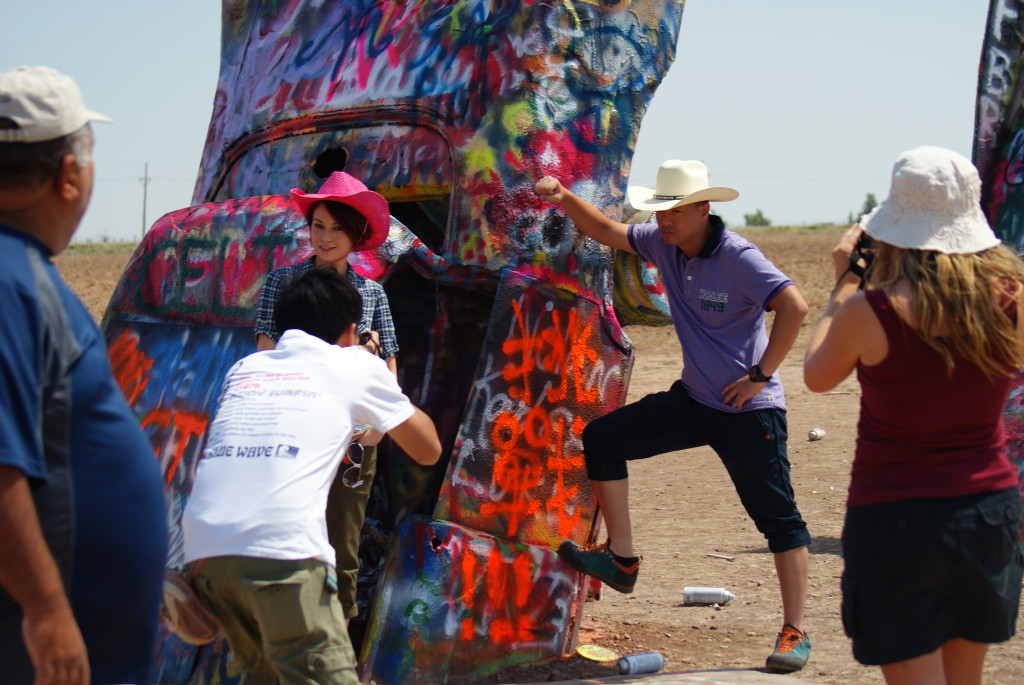
I had the two Hong Kong celebrities in the backseats of the cavernous Suburban. I inhaled the glorious toxic scent of new car. Keiky, the researcher and scriptwriter, sat beside me in the passenger seat. Lawlaw Law was sawing logs already from the back row.
“Nice leather,” Wong He said, admiring the Suburban. He was a Buddhist. Leather seemed an odd thing for a Buddhist to admire.
Yan Ng, the female star, put on a coat even though it was almost a hundred degrees outside. I examined her prettiness in my rearview mirror. According to Justin, she wasn’t just a TV presenter but was also a famous singer.
“Where are we going?” Keiky asked me excitedly.
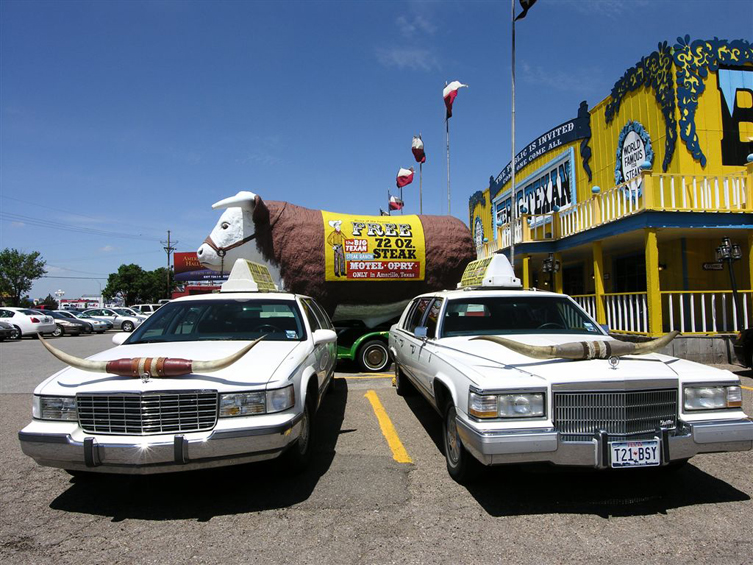
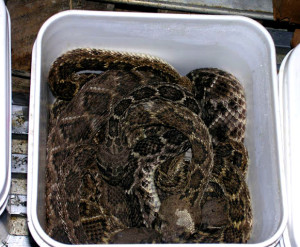
“To The Big Texan, in Amarillo, Texas, to eat rattlesnake, bull testicles and a free seventy-two-ounce steak—free, that is, if you can eat the whole thing in an hour,” I drawled, and then felt like an idiot for drawling. “Have you been doing a lot of research about storms?” I asked her. I wasn’t sure what I should explain. As the scriptwriter, she really should have been riding in the lead vehicle with Ron.
“Have you seen a tornado before?” she asked.
“Yes, with Ron, in Nebraska. I drove right toward it.”
“Was it an F4 or F5?” Keiky was schoolgirl cute, adorned in kittens and bows, but I had the sneaking suspicion she could be as deadly as a crouching tiger.
“A tornado only gets an F-rating if it hits something like a barn, bridge, outhouse, or Wal-Mart, and then the damage is assessed,” I explained. “The tornado I saw didn’t hit anything, so it wouldn’t even be counted. Even if we drive toward a tornado that’s a whopping F5 in power and size, it’s a zero if it doesn’t hit something. Practically every year you hear it’s a record-breaking year for tornadoes, right…yes?”
Keiky nodded—but she might have been nodding off to sleep.
“It isn’t that there are more tornadoes. There are just more housing developments and shopping centers being built in their paths,” I continued, trying to make my voice more animated, like a teacher during story time. “More twisters are being counted with F-ratings because there are simply more objects for them to hit.”
“Uh-huh,” Keiky said, rooting through her enormous purse—probably looking for a pair of earplugs.
“Anyway, we’re not going to get any severe weather for a few days—it’s been really hot and dry. And we’re going to have to head far north for the weather coming over the Rocky Mountains. There’s been a drought in the U.S. all summer. For a big storm you need a few main ingredients—moisture for starts, and there hasn’t been any, instability, and lifting agents…” I saw Keiky’s eyes glaze.
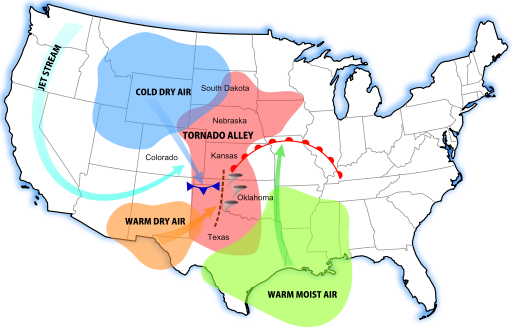
Ron explained it so well. He used ice fishing as an analogy. I decided to channel him. “Hunting for tornadoes is like going on an ice-fishing trip,” I said. “You aren’t going to try and drill a hole through ice that’s 1,000 feet thick—you’re going to look for where it’s thin. If the ice is thin, it’s easier to break, and then you get a hole. It’s when the weather conditions such as updrafts, lift, moisture, and instability can penetrate the CAP, where the hole is, that you can get a tornado. Ron will be looking for where the ice is thin.” I loved this so much. It turned my crank, but something about my explanation wasn’t working. Did they even go ice fishing in China?
“Have you seen the movie, Twister?” I asked.
“Oh, yes,” Keiky applauded. “We watched this for research.”
“It’s just like Twister,” I said. “But I’ve never seen flying cows.”
“How long until we will be in Texas?” Keiky asked.
“Just a couple hours.”
She sat back and closed her eyes. Lawlaw was snoring, and Wong He and Yan were hunched over their phones.
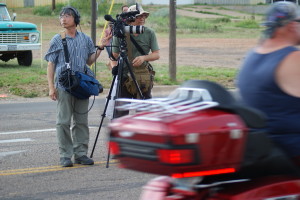
A few hours later, while the Hong Kong film crew ran around the leaning water tower of Texas, the storm chasers watched a single cell storm, in the middle of a horizon-to-horizon blue sky, making its way across the plains.
Ron nudged me. “I told you.” He pointed north. “We’re heading to Colorado and Nebraska, then over to the Dakotas. We should get something big in the Dakotas.”
Wong He saw me taking pictures of the little storm. “What?” He asked.
“It’s exactly what we need. It’s a great sign. It means there’s now moisture.” I was thrilled.
“It’s just some rain. Pffft,” he said, dismissing it with his hand. “It’s not a tornado.”
It hit me: No wonder Ron’s brilliant ice-fishing analogy seemed to fall on deaf ears. The TV crew was here to see a tornado—they weren’t interested in the process. And because of that, unless they saw a tornado, the trip would be a write-off. The work that went into finding a tornado was part of the journey. But the Chinese group was snacking and snoozing and gaming, Facebooking and tweeting and texting. They were more involved in their virtual lives than with what was happening in the here and now. They’d seen Twister.
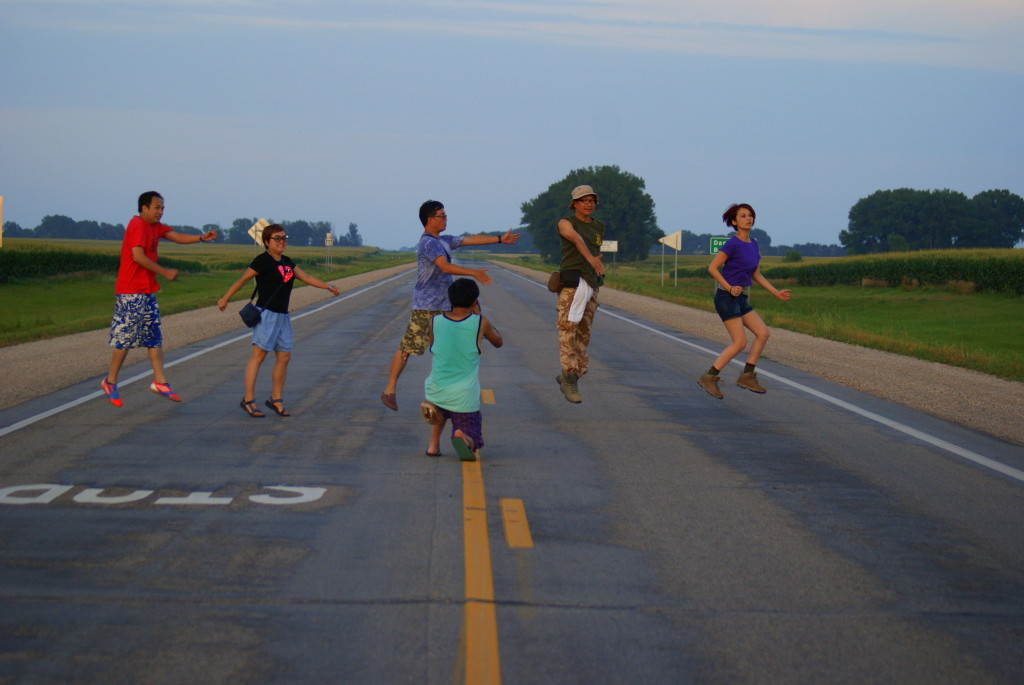
Day two: Texas, New Mexico, Colorado, all in one day’s drive, and now on our third day we were back in Nebraska and the weather was severe. I kept my eyes on Jen’s taillights while also watching for deer or livestock that might fly across the road. Wind rocked the Suburban, and my passengers sounded like spectators at a fireworks show as they oohed and ahhed over the forks of lightning. Nobody was hunched over a handheld device now; their faces were pressed to the windows. I angled my rearview mirror back at the road. Stock-Car was right behind me, but not too close. The man could kiss your license plate on a highway. I recognized this roller coaster of road—we were near Valentine.
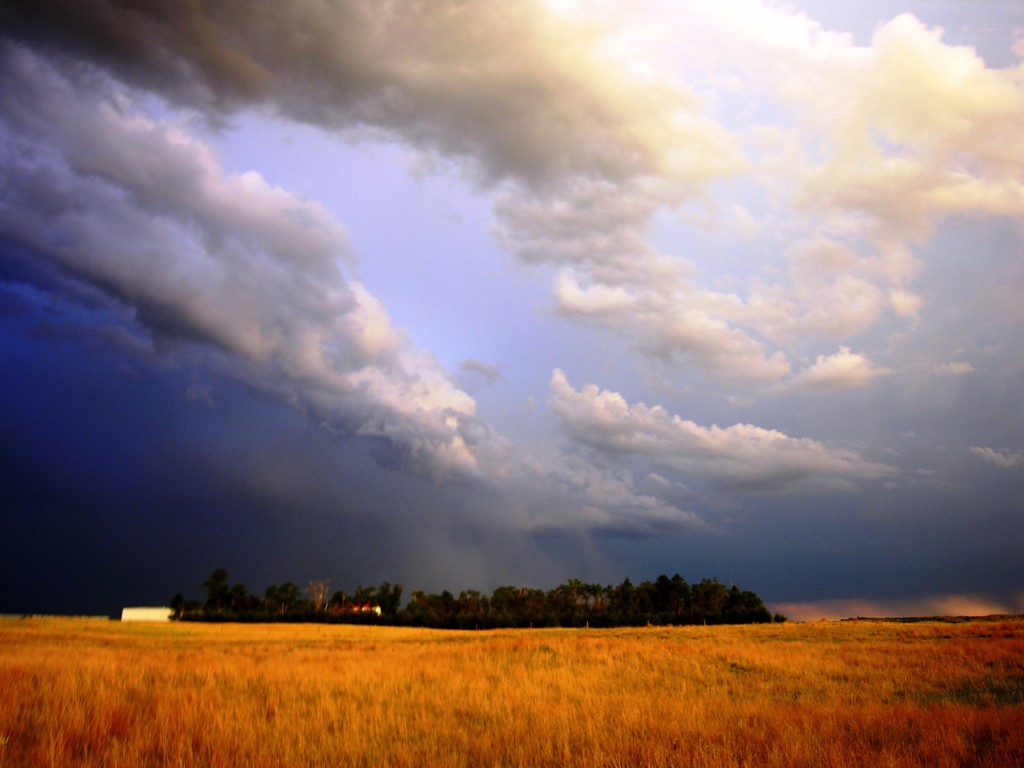
Lightning eviscerated the sky.
“There’s rotation!” Ron yelled over the thunder from behind.
I stood under the power lines between Wong He and Justin. Sand fleas attacked my shins, but I didn’t move. The Chinese cameraman, soundman, and tech all struggled with their wires and equipment while I took photos. Bright yellow grass angled in the wind against an ash blue sky. Then, out of the revolving super cell above us, a funnel descended. I was transfixed. It was right over us. Hell from the heavens was reaching for me. In order to be a proper tornado, it would have to come in contact with the ground. I prayed it would.
My first tornado had looked like barbed wire, but this funnel was smooth—almost sexual. I looked behind me and clocked where the Suburban was, to calculate when I’d need to run. Maybe now was the time to run. Was now the time to run? Ron, Ben, and Jen, whose long blonde hair whipped up over her head like a science experiment, were on the road beside the vehicles. Why was I standing on a hill under the power lines with a tornado trying to materialize above me? In Twister, the character Dusty warned that one should stay out of the suck zone. And if this cone reached the ground, we’d be right in it.
“We’re going east!” Ron yelled.
We bolted to the vehicles and headed down the road alongside the storm. Then the rain hit. We had been ahead of the front. Now we were behind it, and it was like driving through a waterfall. I masked my slight state of panic with my “business as usual” face. Storm chasing becomes dangerous when you can’t see. This was now officially death defying, and just like the time I was on an airplane with malfunctioning landing gear, my son Rigel, now thirteen, popped into my head.
I didn’t want to die and be Rigel’s big disappointment and life-long baggage. Regardless, I was still annoyed by my mother’s gym acquaintances They thought it was so cool that I was tornado chasing until they found out from my mother that I also was a mother, and then they disapproved. I white-knuckled the steering wheel as we hydroplaned. You don’t have to stop living life to the fullest just because you’ve given birth. Rigel was proud of my quests.
We turned onto a gravel road.
“You’re going to get to try out your helmets,” I shouted. “We might get hail.” I grinned at Wong He and Yan. They’d brought helmets from China.
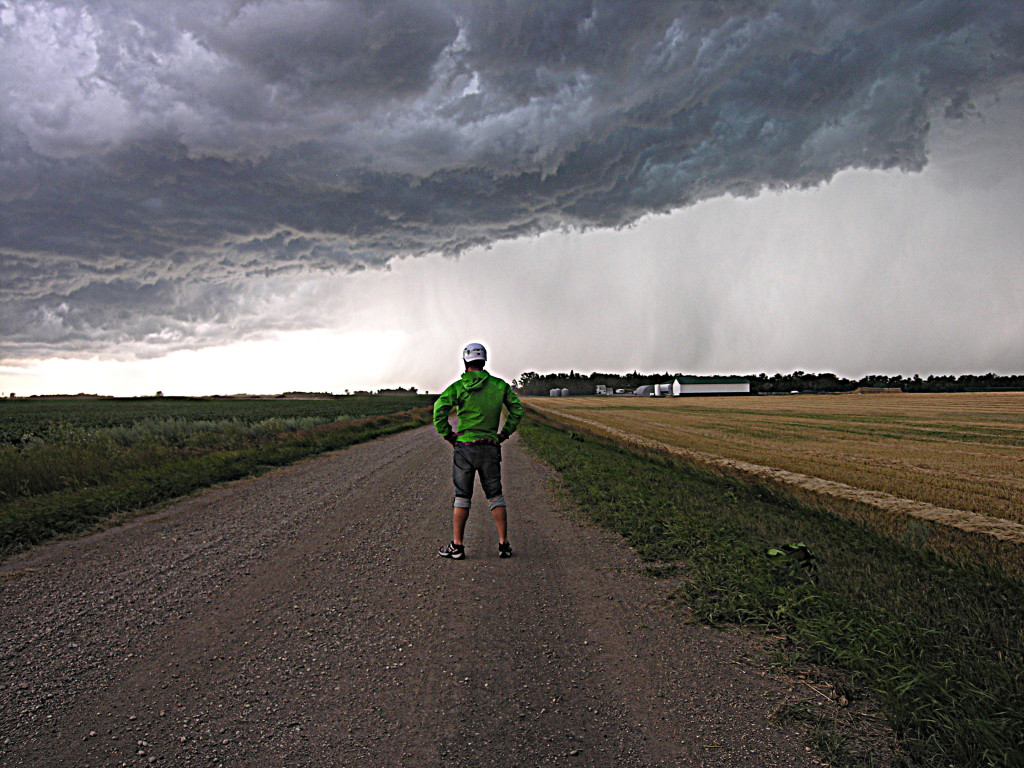
Wong He smacked the top of his helmet to prove its strength, and then before I knew it he was out of the Suburban and leaping across the grasslands, talking to his video camera in the torrential downpour and deadly lightning while the crew set up.
Lawlaw Law made a sarcastic comment in Chinese. Tone of voice can be universal.
I videoed He as he jogged to the lead vehicle to stand under the shelter of the rear door with the crew. Suddenly Woody, whose job was a mystery to me, pushed Wong He and grabbed his camera, then tossed it into the back of the SUV. There was rapid-fire shouting in Cantonese. When Woody turned his head—maybe he felt me watching—Wong He lunged for his camera and marched back to our Suburban with it.
I wanted to ask what had happened, but Lawlaw Law was sitting in the back with folded arms and an expression of extreme distaste on his face. What I saw in the rearview mirror frightened me more than an unseen tornado. I saw primal loathing, maybe even utter hatred. I fiddled with the skipping rope that Ben had bought me in Colorado so I’d have something to jump over at rest breaks. (For the first few days I’d been air-skipping in parking lots across five states—you had to do something to counteract the fast food diet, arguably the most dangerous part of tornado chasing.) I looked back in the rearview mirror. Wong He was peeling off his sopping clothes. He was gorgeous. He was living on apple slices and water.
I, on the other hand, was living on Quarter Pounders. I was hooked. It happened every time I did this. Maybe I was partly doing this as an excuse to eat salty, greasy, splendid junk? I angled the mirror at myself. Yuck, I thought. You really are what you eat. I turned the mirror back to He. It was perfectly fine to admire the guy—even if I was married. Surely it was acceptable to admire the George Clooneys on our planet. I grabbed my pulled pork sandwich out of the center console and took a huge bite. Fat ran down my chin. Oh, God, I thought, I love this job.
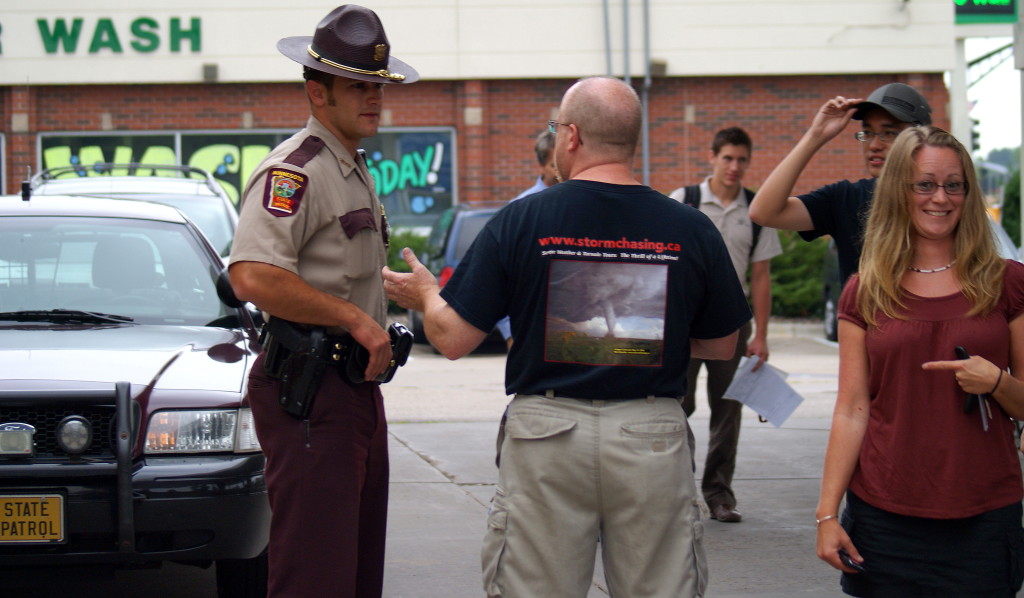
Nebraska, and then just one day later, Iowa and Missouri, and the following morning Minneapolis, Minnesota—where Stock-Car was rear-ended during morning rush hour traffic. The SUV was fine, but the car that hit Len, Ben, and Justin was totaled. Len figured the young driver must have been texting to miss the large SUV right in front of him.
Day six, South Dakota—the Chinese group were still texting and tweeting and Facebooking; in restaurants and on the road, they never stopped looking at their handheld devices. Day seven, North Dakota—Ron filed official weather reports over his radio. A road sign for Winnipeg, a sign for Fargo, and many wood chipper jokes amongst the westerners later, we were now parked on a dirt road as dust sandblasted anyone who dared to stand outside. A super cell worth risking my camera lenses for was fast approaching. I could barely see due to the flying dirt, but I recorded Yan being blown right off her feet. The soundman’s plastic raincoat flapped loudly as it was shredded by the wind. The ingredients were almost perfect for a tornado.
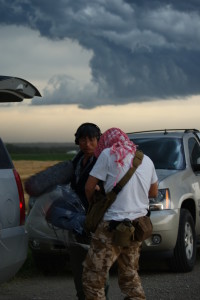
“If a tornado is going to come down, it’s coming down right there!” Ron stood with his hands on his hips, apparently oblivious to the stones hitting his bald head. He did the same thing in hail. He was so intent on the weather I doubted he’d notice flying monkeys. I was terrified of the flying monkeys.
A whirlwind of grit scoured my eyeballs, and I ducked inside the Suburban to retrieve my sunglasses. Today I was driving for Ron in the lead vehicle. Wong He was sitting in the back of the 4×4 on his own. Now was my chance to ask.
“He, what’s going on? Everyone seems mad at you. They’re obviously ignoring you. It’s practically a Mennonite-style shunning.”
“You noticed?” He threw his hands up in exasperation. “They want me to lie and say I saw a tornado, when I haven’t. They’re all mad at me because I won’t do it. I was hired for my integrity, for my reputation. I’m not going to ruin my reputation.”
“The trip isn’t over. You could still get a tornado. Maybe any minute…” I hoped we would, but this storm was so spectacular, it didn’t matter if we didn’t.
“You know what Yan’s line in the script was, just then, when she was blown over? Her line was, ‘It’s windy.’ That’s the type of lines they’re giving us. That’s like filming someone eating chicken and they say, ‘It tastes like chicken.’ They’re giving me nothing. They don’t care about the storms or how they’re made. They just want to see a tornado.” He picked up his camera. “Did you see them take my camera yesterday? They told me I wasn’t to film anything myself because they’re paying for me to be here. I took my camera back.”
“I saw that. It was terrible.”
“I feel sorry for them too, though,” he said. “There’s so much pressure. They have to film a tornado. They can’t go back to China without one—it will be seen as their failure. That’s why they want me to lie. I talked to the executive producer in China today. He said I should just say on camera that I saw one, and he won’t use it in the show, but that way I can at least get along with the crew.”
I had a bad feeling about that. But I said nothing. I put on my sunglasses and dusted off my lens before stepping back outside.
Ron was looking at his camera’s viewer. Then he lowered it and squinted at the field, now just a wall of debris heading right at us.
“GO!!!” Ron ran full-speed toward the SUV with me right behind him.
I jumped into the driver’s seat, heard doors slamming behind me, and floored it, spitting up stones. I looked in my mirror. Jen was screaming at the Chinese crew to get in the vehicle. You didn’t have to be an expert lip reader to see she was tossing F-bombs at them through the dust.
“Jen isn’t following yet,” I said to Ron, who was looking at Baron Mobile Threat Net, his live weather software that showed our vehicle in relation to the storm. We crested a hill and were airborne, then sped down the far side.
“Take the next left,” Ron ordered.
We were at the next left. I hit the brakes. “They’re still not here!” They wouldn’t know if we went straight or left. I didn’t have my walkie-talkie. It was in the other truck. Where was Jen? I purposely held back and watched the top of the hill.
“GO!” Ron commanded.
I saw Jen crest the hill. I hit the gas and braked and attempted to drift around the corner on the loose gravel, but the vehicle’s excellent traction control made it difficult.
“My camera picked up a tornado but we couldn’t see it,” Ron said. “It was behind the debris. It was right there. Exactly where I said it would be.” Ron tilted his camera so I could see, but I didn’t want to take my eyes off the road.
Ron liked my driving because he said it was “smooth.” I could pass traffic on the shoulder of the fast lane doing one hundred miles an hour while he calmly worked the weather.
Just then, a blinding ball of light exploded behind me. Stock-Car’s SUV had been hit by lightning. But they were still coming. Now that man could really drive. Hail pummeled the windscreen; I was driving sightless and knew it was wrong, but I didn’t want Ron to see me fail. And I didn’t want the TV crew to miss a tornado because of me. The barrage of ice stones on the roof was deafening. I kept driving. Ron told me to take the next right. I missed it. He gave me the “special” look, the “how especially stupid are you” look—the one he saved for dimwitted hotel receptionists and waitresses.
That evening as we checked into our hotel, Jen and I made excuses to Ron, Ben and Len about needing vitamins and not a germ-loaded buffet, but in truth we’d already spied the buzzing neon signs of a Mexican restaurant close to our hotel. We got drunk on Oz-green margaritas—which we decided had lots of vitamin C—and fended off a grifter in a Hugo Boss suit and a clip-on tie. We tumbled into our beds hours before the buffet-seeking storm chasers and Chinese crew were tucked into theirs.
Day eight was the other kind of “suck zone.” It had been a fruitless trek back and forth between the Dakotas. And now, on day nine, we had to drive 900 miles back to Oklahoma. The trip was over. For the Canadian crew, it was a success. We were chasing storms. For the Chinese crew it was a failure. They were chasing tornadoes.
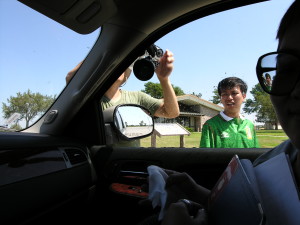
There was a camera attached to my side-view mirror that was focused on me (or maybe my crop of fast-food pimples), and another on the front of my vehicle, plus one on the passenger mirror trained on Wong He. We both wore microphones. The cameraman and soundman were squished between us, capturing our road-trip banter. We talked about Facebook etiquette and the chiropractic back cracking He had given me the day before. But I desperately wanted to ask him whether he’d lied about seeing the tornado. Jen had told me as we loaded the trucks in the morning that both the director and Keiky had asked Ron if they could buy footage of past tornadoes he’d captured, but they didn’t give him the reason. You couldn’t just lie about a tornado. I knew Ron would never sell it to them if he thought they were going to lie. But I couldn’t ask He about this while on camera.
I was relieved to see Wong He back in the passenger seat. He’d driven for a stretch earlier in the day—he wanted to drive, he said, to help me out, because I was exhausted. He’d said it was his gift to me. Then he overtook a truck on a blind hill, which was the closest any of us had come to dying on this trip.
“Stock-Car-Len sure tore a strip off your hide for your driving earlier today,” I said.
The cameraman leapt in for a close-up of my face. I hadn’t known the man spoke English until that moment.
If I had a crystal ball, like the Wicked Witch of the West, I’d have learned that nine months later the Chinese crew’s disappointment over not filming a tornado would be nothing compared to Ron’s frustration over never reclaiming from U.S. customs the thirty thousand dollars he’d ponied up to fund the trip. And that the storm chasing episode had yet to air in Hong Kong due to a bureaucratic quagmire—so I still wouldn’t know if Wong He had to lie or if he’d told the truth.
But for now, I ignored the cameraman. Keeping my hands on the wheel, my eyes on the road, and my mouth shut, I drove on.


